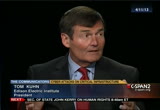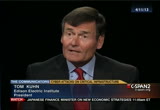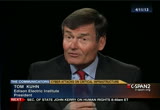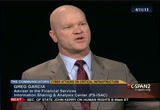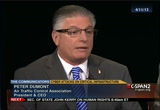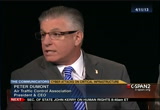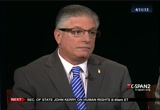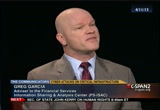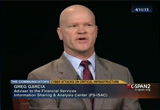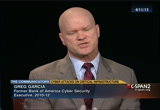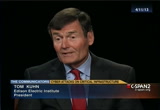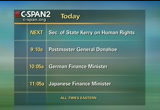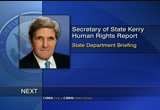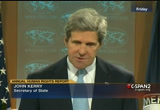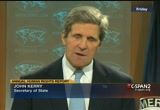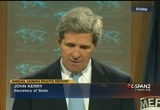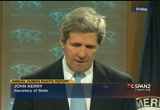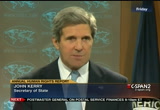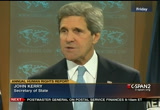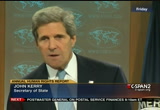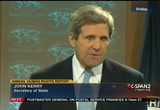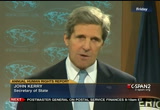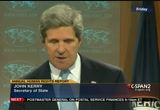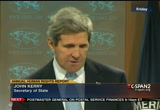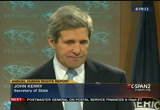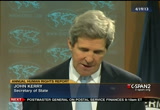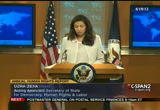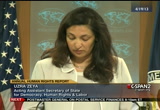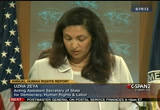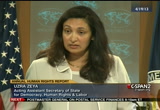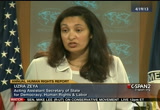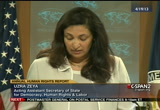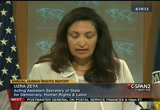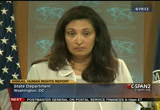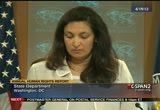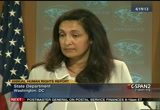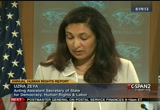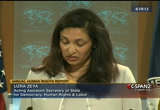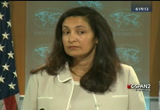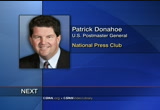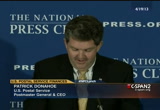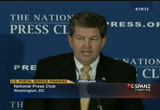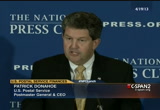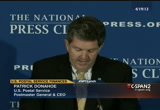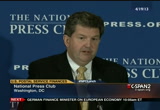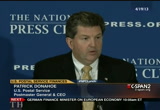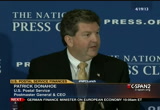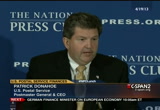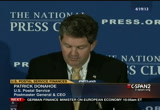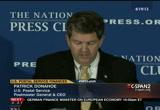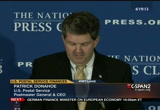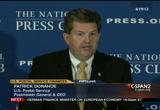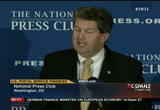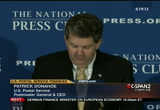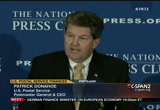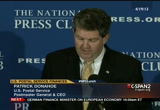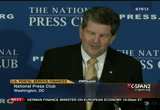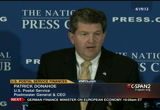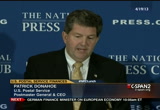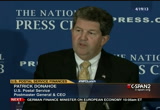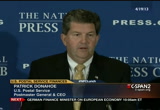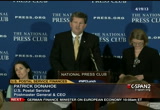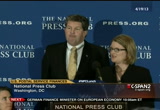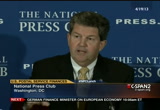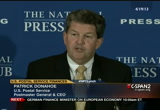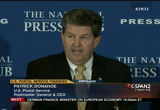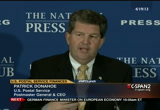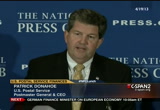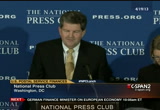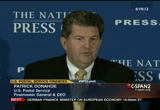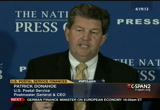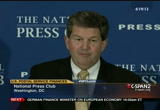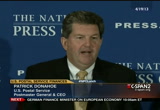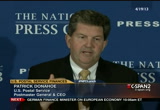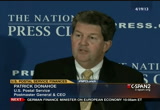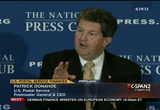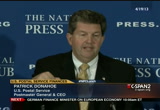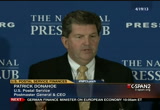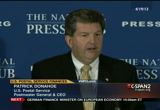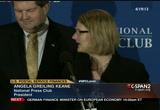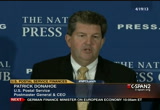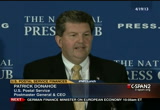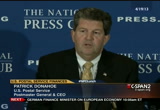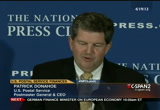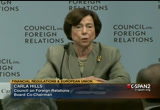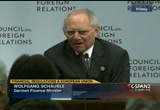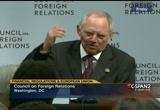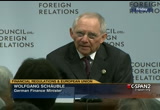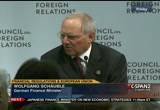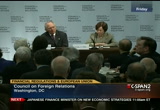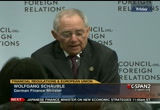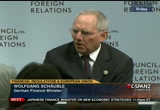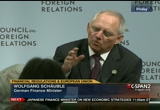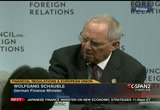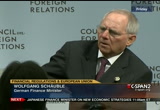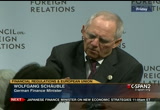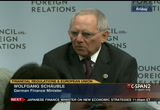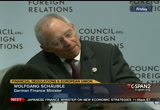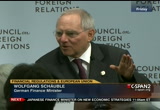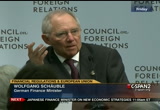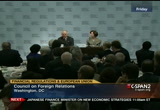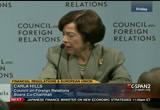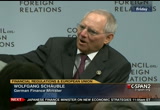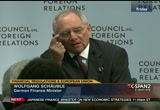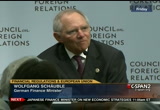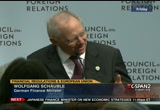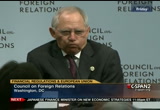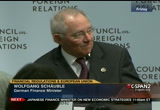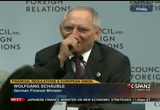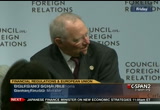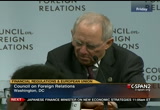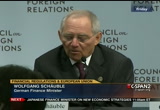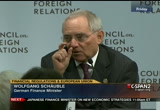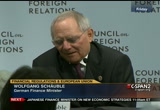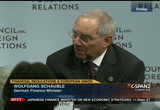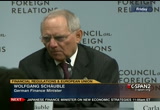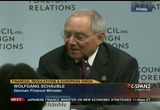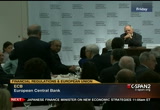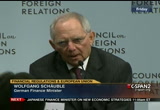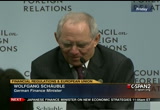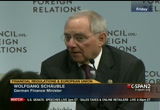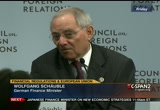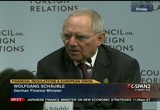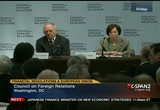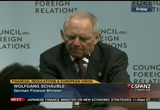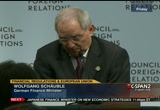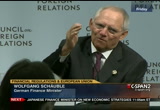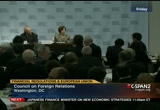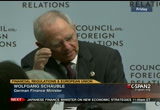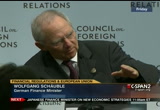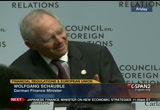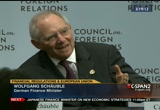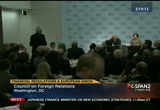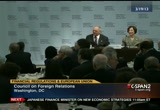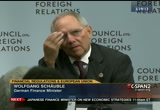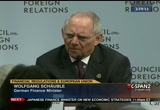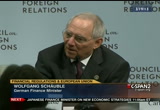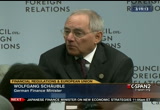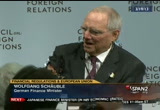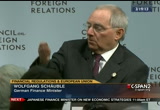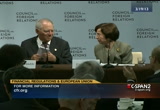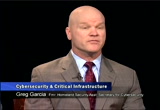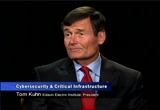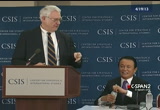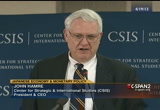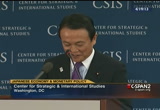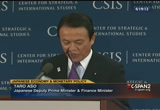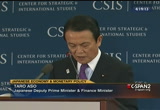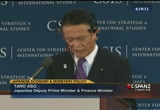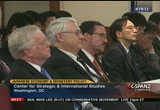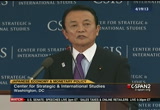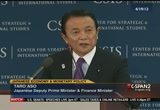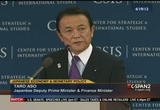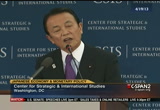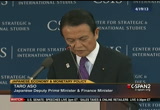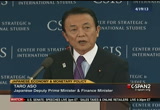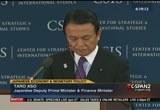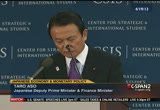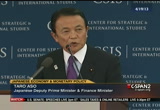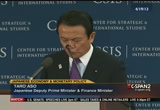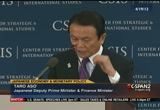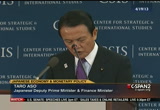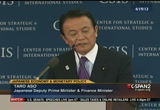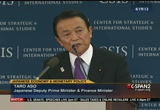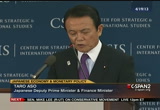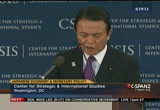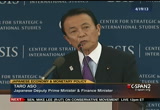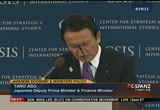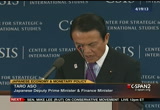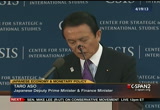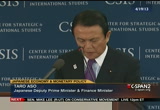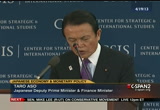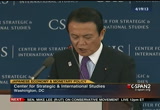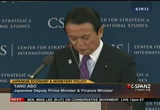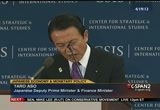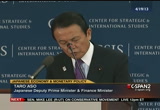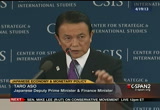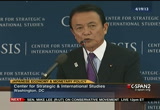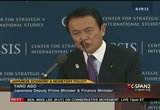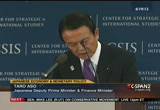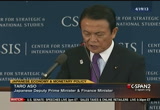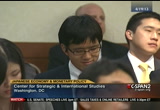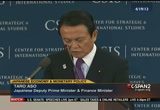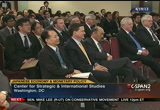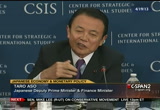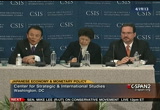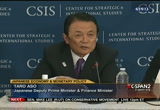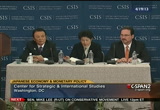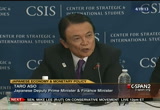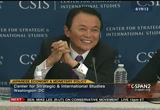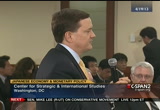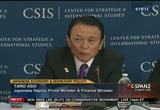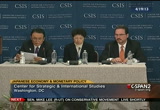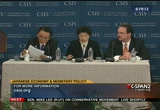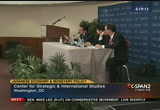tv U.S. Senate CSPAN April 22, 2013 8:30am-12:01pm EDT
8:30 am
threats are out there both, you know, individual, terrorist, national, etc. and i think that there's a new urgency going on ishole cybersecurity issue. and i think every industry needs to be proactive because we all are very interdependent, as greg indicates. >> host: gautham nagesh. >> you spoke that the industry has standards, but they are largely minimums. what impact has that had across the energy sector? have those standards helped compel better security practices? >> guest: i don't mean to imply that the standards are minimum, that we're not trying to do good standards. i just think in any kind of standards regime they are the minimum that people are required to do, and then you go beyond that, you need to go beyond that. for example, beyond our standards we've set up threat scenario projects with michael chertoff and his group, the former secretary of homeland security.
8:31 am
we are, so we go from those threat scenario projects. we've got working task forces on each of the key elements that we think are important, tools and technologies. war the, what are the best technologies we can use for both prevention and te -- detection. secondly, on the issue of information sharing, what are the things we need to do to improve the information sharing flow between government and industry, and that is a focus of our discussions with the various agencies who we deal with. and thirdly, very important for us is response and recovery. again, we build a lot of redundancy and resiliency in the system. we do recovery pretty well like hurricane sandy. we brought 67,000 crews from all over the country to help get the system back on. but cyber is somewhat different. and so we're working very, very diligently on a response and recovery plan. so if there is an outage, if there is caused by
8:32 am
cybersecurity, we can come back quickly. >> but, again, the question really is th oama administration and mnyate democrats have maintained the implementation of standards even if they are baselines for critical infrastructure sectors would compel better behavior. have you seen that in the electric industry that that the establishment of standards force companies to take this more seriously? >> guest: well, sure. absolutely. because, you know, if there are standards or people in the companies that are responsible for implementation of the standards, there is a federal regular later that you have to go to to been -- regulator that you have to go to to be accountable, so there is that attention that's there. and i say, as i indicated, you still have to go way beyond the standards in order to get the -- >> guest: and, you know, beyond the standards, you know, one of the biggest threats the human element, the insider threat. the errors of comission or
8:33 am
omission. and employee training is one of the most important things you can do. the best technology, the best procedures. but if your people are not trained or your customers are not trained, so the financial industry sees its customers as part of the broader ecosystem. not only are we trying to protect them, but we're trying to educate our customers day-to-day on our web sites, etc., on how they can protect themselves. and that's really a key part of it. yes, there are insiders who are malicious, but a lot of the cyber attacks can be prevented if only your employees had as a matter of habit the knowledge that you don't click on that e-mail that you don't recognize, that you don't open the attachment, that you don't recognize. if it looks suspicious, pass it on to your security team. those are some of the most element always of preventing cyber attack. and it is one of the biggest hurdles we have to get over. >> guest: and some nation security agency and the dense
8:34 am
department companiesyou know, have been, had breaches with respect to thumb drives being brought into their system. >> guest: yep. >> guest: it's to, theoretically, play music. >> guest: even the people who should know best are still getting duped into misbehavior. >> host: pete dumont, air traffic control situation, first of all, who are you representing, who's paying for any cybersecurity that your organization may have? >> guest: well, my organization doesn't have cybersecurity. what we do is three years ago we recognized that there was a need to start discussing and educating about cybersecurity in air traffic control. my members are individual members like air traffic controllers. they're companies like lockheed, boeing, raytheon -- >> host: the airlines? >> guest: pardon me? >> host: the airlines, are they -- >> guest: yes, absolutely. air traffic control touches every part of aviation, so just about every part of aviation is a member of my organization. we recognized about three years ago the need to start educating. and what we did was wetart
8:35 am
putting a cybersecurity day inps gomefrom all different parts of iusy together, and did tabletop scenarios and operational scenarios, because that's really the problem. we have operators out there that need to be educated, air traffic controllers. so we don't have the same issue that you have that somebody be might open an e-mail, because the e-mail system is a different system than the air traffic control system, obviously. but if we don't, if we can't recognize that a threat's happening, then we can't react to it. so we're trying to educate on an operational level first of all what a threat looks like, how to deal with the threat and then a managerial level. so now what do we do throughout the whole system once we recognize a threat? do we shut it down? how do we isolate it? do we have the capability of isolating it? how many different systems are affected? you know, those are the technical things. so what my organization is doing now, we've got another
8:36 am
ju is we're having another cybersecurity day where we're talking about what we've learned from the first two, talking about the president's executive order, abt at maythe agency, e faan do to beeer up their management of cybersecurity. >> host: and so do you work with nsa like tom kuhn said or with dhs like greg garcia said? >> guest: well, we don't. we advocate, and what we think is the right solution is the faa, the government agency, they need to learn with those bodies. they need to learn to understand exactly what's being done in the different industries to deal with different threats. and that's how we're going to develop our own best practice. >> host: gautham nagesh. >> greg, you mentioned that thebacking industry is largely ahead of the curve when it comes to these sorts of things, likely due to the nature of the business itself, and like you
8:37 am
said, the criminals are often looking for money. how would you say the broader employees of your industry, how successful would your education efforts be, would you say, and have there been any keys that could be applied to other critical infrastructure sectors? >> guest: i think the, you know, by and large, employees within the financial institutions, um, are fairly well aware of what's going on, and, you know, given over the last year increasing news about attacks on the financial system, the awareness has only grown. as part of every bank's standard procedures, employees are tested. they're trained twice a year, often twice a year, and ten they're tested -- and then they're tested. a random sampling of 10,000 or so employees will get a so-called phishing e-mail from the chief information security
8:38 am
officer, and it will try to dupe them into opening up. and the e-mail looks just about perfect, but there's just one little thing wrong with i just enough to throw off a vigilant employee. and if they actually open the e-mail and open the attachment, they get a nasty gram from the chief information security officer saying you need to go back to training. if they forward that bad e-mail on to the security office and saying this is a suspect e-mail, then they get a love note. and so it's that kind of ongoing, and it has to be ongoing. because we forget. i mean, we're dealing with hundreds or thousands of e-mails a day and documents and phone calls, and you're just moving. it has to be continually ingrained in your standard procedure, in your way of thinking. it has to become a habit. >> host: gentlemen, we only have about three minutes left. very quickly, what kind of
8:39 am
legislation, if any, would you like to see congress passesome. >> guest: i think, you know, i talked about cispa earlier. i think if we can get rid of the barriers, you know, as pete mentioned that hamper information sharing between the government and the industry and providing liability protection to companies who do voluntarily disclose information, i think that would go a long way. i think the goth needs to continue to -- the government needs to continue to invest in research and development, basic research, the kind of research that companies -- companies do the development side. government needs to do some basic research to deal with some of these big problems that are coming as a result of the positive effects of innovation. but there's negative effects as well. so those are a couple of areas. and make sure that we clarify who's responsible for cybersecurity policy across all of the various industry sectors. >> host: pete dumont. >> guest: i would agree with everything that you just said,
8:40 am
and i would also add that, you know, minimum standards are very important. so in turn, we have the right insuring that goverent agencies, that they're being legislated focus on education as well as mitigating risks. >> host: and mr. kuhn. >> guest: the controversial part of legislation out there is mandatory regulations. and, again, we've already got them, so we don't -- we're not really concerned about that aspect of it. information showering, i think, is very, very important. the r&d is very important. liability protection, i think, is another important provision to make sure that companies can feel free to share information and not worry about lawsuits and things of that nature. but i think the important thing is the executive order has been helpful, in my opinion, but don't wait for the legislation. sometimes it takes congress a long time to do things, and i the we all need to begin to move forward without the legislation.
8:41 am
>> host: tom kuhn represents edison electric institute, pete dumont is president and ceo of the air traffic control association, and greg garcia has several former titles and currently is an adviser to the financial services information sharing analysis center. he represents the financial service companies. gaw them nagesh represen cq roll call. gentlemen, thank you for being on "the communicators." >> guest: thank you. >> guest: good to be with you, thank you. >> c-span, created by america's cable companies in 1979, brought to you as a public service by your television provider. >> coming up next, secretary of state john kerry on the state department's human rights report. then u.s. postmaster general patrick donahoe gives his financial assessment of the postal service. and remarks by the finance ministers of germany and japan.
8:42 am
>> also today, mike lee of utah talks about his party's future and the strategies of winning republican support for the conservative agenda. he'll be speaking at the heritage foundation here in washington. you can see his remarks live at noon eastern -s2. >> secretary of state john kerry says anywhere that human rights are under threat the united states will stand up and promote freedom, openness and opportunity for all people. he made these comments during the release of the state department's annual report on human rights. secretary kerry is joined by the acting assistant secretary of state for democracy, human rights and labor. this is about 25 minutes. >>good afternoon, everybody. some people asked whether or not
8:43 am
we might postpone this today because of all that is going on, but we thought that on the contrary that it's part of human have the right to run in a marathon without violence, and people have a right to enjoy a holiday without terror and that the rights of people are represented in many different ways. so we proudly stand here today to release again our human rights report. and i want to thank, i'm glad to be here with assistant secretary zaya as we present this year's human rights reports. these reports send a very clear message that all governments have a responsibility to protect universal human rights, and they
8:44 am
help to blaze a path forward for places where those rights are either threatened or denied. i think this is one of the things that we can be the proudest of that we do here in the state department and if our country. and in our country. upstanfor values and speaking out for people o often don't have any chance whatsoever to speak out for themselves. this report reaffirms in few judgment america's commitment to advancing basic freedoms and dignity of all people, and our support for the brave men and women around the world who are working towards that goal sometimes unbelievably courageously, in isolation in the most deserted places without the glare of the camera or the support of a lot of people. there are people of courage, amazing courage around the world fighting for these rights. and we need to stand up for them and stand behind them.
8:45 am
so i thank my colleagues at the bureau of democracy, human rights and labor and in our embassies around the world for many, many long days that go into these reports. this really is a yearlong effort, because the reports are taken seriously, and we want them to be based on fact. and so there's a great deal of analysis that goes into them. there has to be. there should be for one country, let alone 199 countries that are represented in these reports. during my time as a senator, i traveled around the world, and i saw firsthand men and women who had lived their entire lives without the most basic rights whether it was the right of the freedom to speak their minds or to worship freely or to elect their leaders or to choose the future that they wanted for themselves. eve also seen -- i've also seen
8:46 am
firsthand what can happen when we work together and encourage change for the better, that amazing spark that grows into a shining light, a spotlight, if you will, on hope and progress. .. who i met in her own 15, 20 years ago, where she was imprisoned, where after decades of confinement, not unlike nelson mandela, she has come out and enable to forgive and to
8:47 am
start working alongside her former captors to try to build a stronger and for your burma. or as we also saw, the libyans who filled freedom square in benghazi, first to bring down a dictator, and then again to let libya's democratal ected government no other demands. the rights that these men and women struggled for reflect values that we as americans hold dear. they are key to our dna. they are who we are as a country, they are the bedrock of our nation. but they aren't exclusively a american values, and i want to stress that. they are not american rights. they are not western values or western rights. they belong to all people, and all governments have a responsibility to protect and promote these rights. that's what we call them universal rights. and yet promoting human rights isn't a foreign policy, and it's
8:48 am
not a foreign policy priority simply because it's the right thing to do. it's time to our own security. it's tied to the possibilities of prosperity and of nations living by rule of law and of nation's living in peace. countries where strong human rights prevail our countries where people do better, economies thrive, rule of law is stronger, governments are more effective and more responsive, and they are countries that lead on the world stage and project stability across their regions. strong respect for human rights isn't merely an indicator that a country is likely doing well. it actually unleashes a countries potential, and it helps to advance growth and progress. so i ask you just to think of the country like burma for a minute. because of steps towards democratic reform and stronger
8:49 am
human rights protections, a country that had been isolated for years is now making progress. as it reached where we wanted to be? know, but it's on the road. it's moving. and more people are contributed economy and participating in the government, leading toasr growth andnt. and by starting to embrace universal rights, the burmese government has opened the doors to a stronger partnership with their neighborhood and with countries around the world. many challenges remain. corruption has to be rooted out. remaining political prisoners need to be freed. and the horrible mob violence of recent days a is another distressing reminder of how long it takes to build what to talk bill called the habits of the heart -- de tocqueville. but if burma's latest stay focused on promoting and protecting the rights of all people in the country, burma is
8:50 am
likely to continue along a promising path of renewal. for other countries in regions in transition, the way forward is much less clear. and again human rights is going to be a key factor in shaping their destiny's, like the countries of the arab awakening. this is a movement that started with the demand for greater rights, dignity, and opportunity. the tunisian a fruit vendor who lit himself on fire didn't do so because -- based on an ideology are a religion. he did so because he wanted dignity and respect. he wanted the ability to be able to sell his wares without interference, without corruption. the students and tahrir square who brought us the revolution in egypt were driven by religion or an ideology. they were driven by their aspirations to be able to have jobs, education, security, and the future. and that really is the difference.
8:51 am
where entrenched regimes have been swept out and new governments have been slow to guarantee those rights and protect the most vulnerable and build accountable, democratic institutions, we still see resistance in this part of the world. inria, assad is vastly cling to power, responding to the cries for freedom with the murder and mayhem, more bloodshed. the vision of so many who have fought and sacrificed across the region will never be realized if there human rights are denied or ignored. there and elsewhere, governments continue to restrict civil society. they suppress dissent, and they stifle free expression. religious minorities find themselves in prison for violating blasphemy laws. online activists are shut down for criticizing their government, or shining light on corruption, or just trying to speak out and express their views about a different future.
8:52 am
lgbt communities are marginalized or criminalized. women and girls are being targeted through rape as a weapon of war, and being attacked for the simple act of going to scool' ging scol. these tactics are as intolerable as they are shortsighted. they hold countries back, they create instability, they divide societies, and they set off cycles of retribution. so anywhere that human rights are under threat, the united states will proudly stand up, unabashedly, and continue to promote greater freedom, greater openness and greater opportunity for all people. and that means speaking up when those rights are imperiled. it means providing support and training to those who are risking their lives every day so that their children can enjoy more freedom. it means engaging government at the highest levels and pushing
8:53 am
them to live up to their obligations to do right by their people. it means encouraging businesses to respect human rights wherever they operate. for nearly four decades, these reports, the veort we are putting out today, has helped us to make progress forward on that vision. these reports are thorough, they are honest. and they need to be, because our policy are grounded in a clear eyed assessment of governments as they are, not as they want to be or how they pretend to be. with each installment of these reports, we try to dig deeper into the ways that human rights are threatened. this year, we've included more data on prison conditions, official corruption, labor rights, and the effect of traditional practices on women's rights. and we've expanded our coverage of lgbt and disability rights. we hope that these reports will
8:54 am
help lawmakers here and abroad, scholars, help students, civil society groups, and anyone who shares our commitment to universal human rights. but i want to be clear. gemegoveh ments,rts sup ur activists, and advocates,y are only a small fraction of what we do on this issue. they are just one tool to try to shed light and create accountability and, hopefully, move people in the right direction and move our policy forward. they support the efforts, every single day, of our diplomats and our development experts. and facial brave citizens around the world and those who would abuse them that america is watching. those are efforts that i'm committed to. and when i travel overseas, i make appointed meeting with civil society leaders, independent journalists, bloggers, and students, all of whom can offer a very different
8:55 am
perspective on the state of human rights that my government, that government counterparts may present. and anywhere that i sit down with presidents, prime ministers, other leaders of countries, i want you to know this issue is always on our agenda. even when it means telling hard truths. because part of the american spirit is the fierce belief and the dignity and potential of every single person, part of american leadership is speaking out for people who can't speak for themselves. it's also standing up for those who fight for the own rights, as i said, sometimes in the most desolate places, without support. it is our effort to stand up for the universal rights of all people. so again, i thank you. i intend to turn things over now to uzra keya, who will answer any questions and make a
8:56 am
statement, and otherwho will answer your questions as we go forward. thank you very much, everybody. i appreciate it. him thank you, mr. secretary. i would like to say a few words about how we use the report to inform article was around working to get quick overview of some of the major developments they dcred or e yo then i would be happy to take your questions. as the secretary said, human rights are central to america's global diplomatic engagement. these reports are the factual foundation upon which we foundation upon which rebuild and should our policy. human rights are on the agenda in all our bilateral relations, such as during the recent u.s.-vietnam human rights dialogue where we urge the release of all political prisoners including the doctrine of. we advocate on behalf of those in prison for the activism our beliefs, including chinese noble
8:57 am
laureate, human rights lawyer, and pastor in iran him and many others all over the world. the individual reports stand alone and they speak for themselves. so i commend them to you for detailed information on specific countries or region. at the same time i would like to highlight the key developments from 2012. first ashsecretyoed wnt t space fo civil society and a growing number of countries. china, egypt and russia to name just a few. 2012 found new laws impeding or presenting the exercise of freedoms of expression, assembly, association and religion. heightened restrictions on organizations receiving funding from abroad, and the harassment, arrest, and killing of political human rights and labor activists. regardless of the means, the result is the same trick when governments stifle civil society, but countries are decried energy, and
8:58 am
ingenuity of their people that are needed for long-term stability and success in the 21st century. we also saw freedom of the media under increasing threat in 2012. record numbers of journalist were killed in the line of duty as a consequent other reporting to a number of governments has stifled the press with the use of overly broad counterterrorism laws. burdensome regulatory requirements, and harassment or imprisonment of journalists. in ethiopia, a person remains behind bars, and someone spent six-month in a cuban prison for writing about it operate. some government specifically target freedom of expression on the internet for new restrictive legislation, denial of service attacks and the harassment of online bloggers, journalists and activists. in egypt, for example, a blogger has been repeatedly arrested and harassed by the government.
8:59 am
throughout the middle east in 2012, men and women continue to organize and advocate for dignity, economic opportunity, and the stake in their political future. there were historical elections in egypt and libya but also troubling setbacks. including the erosion of protection for civil society, sexual violence against women, and violence and repression towards religious minoes intercommunity engines and political violence continued in iraq, bahrain and yemen. and governments throughout the gulf took steps to restrict freedom of expression both online and off. these struggles are not confined to the middle east. especially the issue of violence against those marginalized groups in society. the 2012 report documents discrimination against and persecution of members of religious and ethnic miners, including jews, roma, coptic christians, uighurs and tibetans, as well as against other vulnerable populations
9:00 am
such as persons with disabilities and lesbian gay bisexual and transgender people in every region of the globe. women and girls continue to be at risk around the world facing abuses ranging from sexual violence to harmful traditional practices. from afghanistan to the democratic republic of congo, women and girls were the targets of oppression while trying to liver daily lives, change their society for the better, and exercise the fundamental freedoms that are the birthright of all human beings. thankfully not all news in 2012 was discouraging. as the secretary said we're encouraging, encouraged by what's happening in burma. the burmese government has released more than 700 political prisoners since 2011, many of whom have been in prison for more than a decade. aung san suu kyi and 42 members of the national league for democracy were elected to parliament and largely transparent and inclusive by election. the government is relaxing some of press censorship and among trade unions to register.
9:01 am
however, many elements of the country's authoritarian structure remain intact. and as the secretary noted we are also very concerned by the conflict and communal violence in central burma. in addition to the elections that are mentioned in the middle east and burma, georgia held parliamentary elections that resulted in the first peaceful democratic transfer of power in that country since independence in 1992. and throughout the world everyday courageous men and women took selfless risk to stand up for universal human rights and better the lives of others. finally, i would like to echo the secretaries of thanks for our colleagues overseas and throughout the department, including our senior editor steve eisen brought, who of all worked tirelessly to put these reported as. this is truly a massive undertaking and every year we strive to do better. this year as the secretary mentioned, we include more comprehension information and prison system, corruption within government, workers rights and the rights of women and girls. we hope the reports will shed
9:02 am
light on human rights conditions around the world, and we're committed to working with government and civil society to stop abuses and support universal rights for all. so i will stop there on that note, and i'm happy to take your question. question. >> i'm just going to call on folks. >> you and the secretary both mentioned that you bring up human rights issues during all your visits, these hard truths as you called them. yet recently when secretary kerry went to china we barely heard a word about human rights. so could you tell us the hard truths that would of been pushed during that visit? >> sure. i would just like to reiterate that promoting human rights is absolutely part of our bilateral agenda with china. we repeatedly raised specific human rights cases with the chinese government in bilateral dialogue and in high level discussion. and during the secretary's visit, as you may visit, as he
9:03 am
made her come he raise specific cases with the chinese government to include the case of the nephew of mr. chen walked change. he raise the allegation of abuse during his imprisonment and the harassment of his family. some of the other cases that we raise regulate i mentioned in my remarks. that would include -- an as i ntione but t is few of the many political prisoners in china. i would refer you to our report which is much more detail on this issue. >> are you making progress regarding their conditions? >> i think it's part of our ongoing dialogue. >> i wanted to ask you about -- about 4500 prison. [inaudible] i wonder if you are trying to increase activity to
9:04 am
kick off the new talks with the israeli government? >> right. i would just like to reiterate that the united states raises human rights issues at the highest level with the israeli government. i commend to you our report this year on the occupied territories. some of the maj human rights problems that we identified are arbitrary arrests, associated torture and abuse, often with impunity by multiple actors, restrictions on civil liberties and the inability of residents to hold their government accountable. and this is taking place in areas under hamas, pa., and israeli control. >> [inaudible]. has the secretary raised this issue with a turkish officials? [inaudible] >> sure, sure. with respect to turkey, turkey
9:05 am
is a vital nato ally and a strategic american part and human rights are part of a broader arrangement. some of the issues of concern noted in the reports are freedom of expression, the status of minorities and vulnerable populations, and legal reform. and what we think is --prese ope protection of minorities and women and children, as well as expanded freedom of expression. >> [inaudible]. this will be his third time in turkey this year. >> it's part of our regular bilateral engagement, but for further detail i would have to refer back to the spokesman. >> [inaudible] don't you think the society that has shrunk even more of since this was covered last year?
9:06 am
and, well, if you could just talk generally about how you see it. because they'r there implementie law that you complained in the past. now they're and limiting it again. >> the reports only are covered ceainly the er that we've but seen ee isia s epy troublingith respct to the emergence of increasingly restrictive environment for the exercise of civil liberties. this includes the measures with respect to registration of ngos as foreign agents but also restrictions on press and internet freedom act. so we've made clear our commitment to dialogue on human rights with the russian government, but we also remain actually committed to open dialogue with civil society and supporting their efforts. >> can i do a follow-up on that? i just wanted, i mean, the u.s. government has talked a lot about, concern about human
9:07 am
rights abuses in chechnya. and i just wonder if you think the events in boston are going to change in any way the way the government will see human rights in chechnya? >> with respect to the ongoing investigationnbston, i just etars, that would be highly inappropriate to make further comment at this time. with respect to the situation in the northern caucasus, i can tell you this has been part of our human rights reporting. on russia and our country reports since 1995 you'll find quite a bit of information in this year's report. and they know serious human rights abuses taking place, and acts of human rights violations reportedly committed by both authorities and the militants. >> this will be the last question. >> i'm wondering about guantánamo prisoners.
9:08 am
[inaudible] >> i would say on this, we hold ourselves to the same standards by which we assess others. on the issue of guantánamo the esen made clear his commitment to closing guantánamo, but this has to be in accordance with u.s. law and in consultation with the congress. so i would have to refer you back to for the statements by the white house and the spokesman on that. >> just to reiterate for folks, the acting secretary will be at the center later this afternoon. >> 4 p.m. spent so we can do other questions when they go over there. thank you. >> thanks. >> up next postmaster general patrick donahoe on the financial future of the postal service. then germany's finance minister
9:09 am
talks about efforts to create a unified european financial system. that's followed by a speech from japan's finance minister a new economic policies aimed at reviving the economy. later at noon eastern, live coverage as republican senator mike lee talks about the future of party conservative movement. >> she was very bright. she was very political, which is why she and lincoln sort of got together in the first place. she spoke several languages for which he was extremely well-educated so she had all these are things going for her, but she had suffered a series of tremendous emotional blows. >> three of her four children die. one in the white house, one shortly after her husband's assassination sitting next to her at the future. i mean, the kinds of grief this woman was going through is amazing.
9:10 am
but folks demonized her, thought she was crazy. well, we found out she wasn't crazy. mary todd was a very significant person, and i hope someday we get a better view of the range of things that influenced her life, not just the tragedies. >> more on mary todd lincoln in a conversation with historians, and you, live tonight at 9 p.m. eron-span andc-span3. also on c-span rated and c-span.org. >> the u.s. postal service is losing money at a rate of $25 million a day which could result in a taxpayer bailout of $58 billion by 2017 if it's business model remains the same period that was the assessment of postmaster general patrick donahoe spoke recently at the national press club in washington, d.c. earlier this month the postal service canceled its plans to end saturday mail delivery which would've saved the postal service about $2 billion a year.
9:11 am
this is about 50 minutes. >> thank you, angela, for that kind introduction. it's a pleasure to be here today and to speak with everyone and we will make sure we've got time for our questions. i would also like tohank the national press club for the invitation, and organizing today's event. the last time i spoke to was 18 months ago. and i gave a speech that made the following points, number one, the postal service is a tremendous organization, and it's in a financial crisis. number two, congress needs to reform our business model and give us more flexibility to solve our financial issues. number three, the lack of quick action by congress will do the postal service and force it to become a burden on the american
9:12 am
taxpayer. i was sorely tempted to give the same exact speech again. but i thought, cynical. i will admit being frustrated by lack of progress on reform legislation over the past few years, and i will tell you i am not cynical about it. and m soical that i would deliver thame ch again. in fact i'm more optimistic than ever about the future of the postal service. a few weeks ago the congress blocked our plan to transition to a new delivery schedule. we said we could deliver packages monday through saturday, mail monday through friday, a key post offices open on saturday. it would save the postal service to point -- $2 billion annually, and it's a necessary part of closing a gap which could be
9:13 am
$20 billion by 2017. the american public supports it by a wide margin, more than 80% support. once they understand the facts, including citizens over 55, and citizens and rural areas. it's the financially responsible thing to do. and yet congress passes a spending bill tha that stops usn our tracks. am i cynical? no, i am not. i believe we will get the flexibility to do to our new delivery schedule because it is the right thing to do. conkers faces a simple choice but i can decide to start appropriate a lot of money to prop up a broken postal service, or it can give the organization the flexibility to operate more effectively. and in case you're wondering what that cost might be, the cost of propping up our broken model, including resolving all the debts and defaults we currently can't afford to pay,
9:14 am
mibe in the of $58 billion, and that's just through 2017. you know what? it would be completely unnecessary. it made sake to learn of the postal service could be profitable today, and in the long-term future. we just need to operate differently. and so i am optimistic. i am optimistic that congress will pass a bill this year and am optimistic about a restructured postal service for the future. earlier this week we published an updated five your business plan, and our plan closes substantial budget gap by 2017, it puts the postal service on sound financial footing for years to come. and what's important about the plan, it's not the fact that the math adds up, because i think anybody here could figure out a way to make math and up if you want to make some pretty strange solution. what's important about this play is it can be implemende manner r
9:15 am
ctomers and employees. we do not have to resort to layoffs. or contracting large chunks of business out from our workforce. we don't have to make radical changes in our products and services nor to our pricing, and we do not have to be bailed out by american taxpayers. we need to make substantial change? yes. can we do it in a responsible way? absolutely. but we cannot afford to wait, and this whole situation, time is money. if we do not start making some of these changes, will only be left with extreme options. and our situation if you think about it, not so much different than what the rest of the federal government faces and a lot of state and local governments face today. we have to get ahead of these fiscal imbalances. if we want to avoid major noticeable disruor make responsible choices now.o
9:16 am
and that's what our plan aims to do. one of the most important changes that we think and the plan is take over our health care plan. everybody believes that the federal system is overly generous in terms of benefits. the truth is the federal health care system is not overly generous to our employees. but it is overly expensive. and that's why -- to a privately run plan. and when we do this we will be able to provide our employees and retirees with the same or better health care coverage and a dramatically lower cost. such a move would save our employees and retirees and our best estimate $700 million a year in annual premium, and was a the postal service $8 billion because we would effectively
9:17 am
eliminate the need to pre-fund one day for the. would also be able to invest much more ineffective health and wallace programs which we can't do know. financially it's a smart move, and also the responsible thing to do for both the employees and the retirees, and it makes sohal optimism that congress will support us. we have to move in this direction and i believe we will. one of the concepts i think a lot about relates to pension, and the notion of the postal employees of the future. as angela said, i started my postal career as a clerk in pittsburgh in 1975, 37 years, almost 38. i went to university of pittsburgh, at night i was a pos processing ler so i think a lot about the organizational change from a perspective from a lot of my own
9:18 am
experience coming up through this place and all those years and i've seen tremendous change in the mailing industry. not just the postal service. our entire industry. and the last 10 years, and i will do this, if you think there was a lot of change in the last 10 years, wait until we see what happens in the next 10 to 20 years. it's going to be more dramatic. we would be hard-pressed to say what our industry is going to look like in the year 2030 or 2040. think about that. that a young person that we are today, like i was tired 20 years old in 1975, will probably be working well past the year 2050, and probably in today's environment, past year 2060. our current retirement model was designed to give an employee the designed intention -- pension after 22 it was a model that made a lot of sense in the 1940s and 1950s, but it's not going to be appropriate for
9:19 am
the 2040s and the 2050s. our world is becoming far too dynamic to make promises about pensions 40 and 50 years down the road. the benefit of the defined contribution system is that it gives employees options to consider. job chanre possible, why old le thebenefits that they may not be able to use for 50 years ask we are currently on a trajectory, a projection to hit about 400,000 career employees by the year 2017. that's with all the changes we propose. and after we reached that number is going to give us a pretty lean workforce. we have a pretty lean workforce right now from a standpoint of a network in the 60 delivery. but after that we will start hiring people. in fact, we estimate in the next 10 years between 2017-2027,
9:20 am
depending on volume, and volume is the key, the postal service will be hiring up to potentially 20,000 people a year annually to replace our workers. i am above average them on 57 but our average is 54 in this organization so we will have a people leaving the organization. we have to put a retirement in place that is appropriate for the new people coming online, and it's got to provide a high level of certainty and predictability in an unpredictable world. and i'm confident that we can sign a great system and tie into systems like the federal first savings plan. it could offer attractive employee contributions and enable our employees to plan for and manage retirement finances much more effectively than they do today. it would be portable which is going to be very important going forward in this world. i would like to have a contribution plan in place for every new employed by the year
9:21 am
2015. it's about continuing to be a great place to work, have a competitive workforce, and being fair and responsible as an employer. and it makes so much sense that it makes me optimistic that we can get the authority under law and get this dne. another important area of flexibility relates to product and services we provide. the postal service does not have pricing flexibly. for example, we can't bend a little bit on an offer we've got with the customer. let's just say we are asked to compete on a contract to ship 100,000 packages for a potential customer over the course of you. will provide a proposal and a price, and our competitors, great competitors out there, they do the same. there is potential -- this potential customer often case goes back to the competitors and say hey, you've got the contract it into a little bit better on price. they don't come back to us because they know it would take way too long to get back to them with some flexibility.
9:22 am
but what we would like to do is make a deal like that and then have the regulatory commission just take a look and review after the fact. makes us a lot more competitive. it's a small change that makes a lot of sense and it would obviously help more effective. and because it make a lot of sense, it makes me again optimistic that we can get this type of flexibility. we would also like to have more flexibility on the types of products and services we provide. technology is going to transform the mailing industry in a lot of new and exciting ways. and we need to support that speedup in the transformation. it's not hard to imagine the customers expectations are going to change dramatically in the coming years. they already have been. if you look around and see the changes, customers tastes are changing. imagine being able to use your smartphone to redirect your mail and packages, have them delivered to an alternative
9:23 am
location. imagine being able to use a mobile app that has the ability to display what you're going to be getting a new mailbox over the next few days. that's going to great opportunities for marketers to build anticipation of what's in wh youhinkabulhe e-maanagyget l is the one last place where you can get a surprise and there's a lot of anticipation you can build around that. imagine if you were to get a notification the moment that your packages and your mail were delivered to your door. imagine if the mail carrier technology enabled someone to tap a piece of them on a smartphone, and not only one click make a purchase, have it delivered at the same time. we can dramatically improve the experience of mail and the expense of delivery if we unlock the power of data and digital technology. the postal service is working on some of these technologies right now. to transform the experience of
9:24 am
mail and shipments. we are pursuing avenues of product development today that are not restricted to existing laws and that's good but we are also seeking additional flexibility and other promising areas. the postal service provides a delivery platform for th $800 billion mailing industry that employs 8 million people. it is a big industry. the way to keep that platform strong is to innovate in ways that improve the experience of delivery and the experience that people have with their mail. having the flexibility to create new products and pursue business opportunities is an important way to keep the postal service and the mailing industry in total healthy. and i hope everyone is as optimistic as i am that we can get the flexibility through law to make this happen. as i look out to the future, there is a lot to build a marketing mail, direct mail as
9:25 am
people talk about, it is abounding -- rebounding nicely. we went through a rough spot with recession, and despite all the ways that people change in terms of communicating and products, marketing mail continues to garner roughly 12% of the total spent in marketing in this united states. it's been consistent for 30 days and that's because marketing mail provides such a strong return on investment for the center. and i have no doubt it will continue to be a strong and growing part of our business. the largest and most profitable part of mail is of course first class mail. that's what pays the bills. we have seen a decline in the user first class mail, yes, we have. people pay bills online, it's free, and it's awfully hard to compete with free. but there's another part of that story and that has to do with first class mail, that businesses into the customers.
9:26 am
it's down a little bit, about 1.5% per year since 2003 but that also includes a substantial drop that we experience with recession in 2008 nd2. and a fairly weak economy since then. but that says that people really do value hard copy statement in response they received a business. they want that information in hard copy and they are resisting the idea of going totally digital. we've heard anecdotally all of the people who did do that, they even missed a payment and they said hey, start those bills back up again. they said don't write the obituary for first class mail. it delivers a lot of value for business center and the receiver and it accounts for $20 billion in revenue for the postal service today, and i guarantee you it's going to be around for a long while. the most promising part of our business in terms of growth is package delivery which is up more than 14% over the last two
9:27 am
years. we created much of that growth by innovating and marketing new benefitingo fr a big rise in e-commerce. the way people use mail and delivery services is changing, and i think it's exciting and i think these changes will create opportunities for growth for the postal service, and throughout the entire mailing industry. the postal service is a tremendous organization with exceptionally dedicated workforce. our people go tremendous job day in and day out. is on this week with the ricin threat to the milk and other. you saw with hurricane headed to the mail got delivered to you and india. postal service plays an indispensable role in the american economy. but today it has its business model that is broken. the good news is that we can fix what's broken. it's just requires that we set aside some outdated visions and use of this organization. it also requires that we have some fundamental questions about
9:28 am
what kind of postal service is best for america in the future. we know we can't stick with their current structure so we've got to create a new one. and we have to be pulle bold bee the scale of our problems are pretty large. in the past year of the postal service reported a financial loss of 15.9 billion. i'm tired talk about that. included in there is an $11 billion default on payments to the u.s. treasury and we have used up all of our bargaining. at one point last we'll head for days days of cash on hand which means we came pretty close in some cases and not being able to pay our bills. the postal service cannot, can't continue to limp along such a weakened financial state. that it's unfair to the businesses that support us. we need to provide customers who compromise their pride every part of the american economy with predictable and confidence
9:29 am
that they need while they're investing in the. and the best way to do that is for congress to helphis broken business model. the sooner the better. we are asking congress to give the personal service the authority and flexibility close what could be a $20 billion budget gap by the year 2017. we can achieve this is the postal service and get ahead of the curve and be profitable for years to come. and it can be done without being a burden to the american taxpayer. all it requires is flexibility and a few keareas. the ability to determine our own delivery frequency. the ability to do developed and priced products quickly. the ability to control our health care and retirement costs. the ability to switch to a defined countries retirement s, strmlin governments model, and more flexibility in the way that we leverage our workforce.
9:30 am
i am encouraged that congress is working on legislaono address ese is.am optimistic thl gain these important areas of flexibility, and if we make these changes, i'm confident the postal service will better serve the american public address growth of the american economy into the future. we are on a responsible, commonsense path to create a postal service that can adapt to changing world. we just require the authority to make it happen. thank you very much a plot back. >> -- thank you very much. [applause] >> usage are optimistic about congressional action this you. what makes you optimistic? >> well, i think there's a couple things. number one, if you think about what's happened over the past few years, there's been a lot
9:31 am
more attention to this issue. i think from an industry perspective everybody has brought that issue. i know from a postal service standpoint of our initial five yen lastyear, a lot of communication their, from what congress hears from our employee unions, management associations, the customer. people know we have to fix this issue. i was very encouraged by the hearing in the house. there was a lot of discussion afterwards from both sides saying we need to fix this and we need to move. >> lawmakers from the house and senate said said you're going to meet this week to begin discussions on hashing out a bill. what have you heard about any meetings and any progress on putting a bill in riding? >> we're waiting to hear the outcome of any meetings that happen. i think one of the things unfortunately this week has caused all of it of destruction is what's been going on, you know, the ricin threats and some of those concerns, and it's been disrupted. i know specially on the senate side.
9:32 am
so we are waiting to hear. i think the leaders in both the house and senate, both parties, have expressed to us thei i think the othehing hairman carper is hearing in a month or half ago, both chairman issa and representative cummings came in and testified that they want to move ahead. >> paint for us a picture of what happens if congress doesn't pass postal reform legislation of this year. >> well, our board has him concerned. that's why we've taken the actions that we've taken. let me give you a little timeframe on that so you will understand a lot of thinking behind that. last fall we thought after the lame-duck, before lend duck session began, we would have an opportunity to see some legislation that looked pretty encouraging and at the last moment things didn't get done. our board has been concern as i mentioned about liquidity.
9:33 am
last year we came dangerously close to not paying does. four days cache is not a good idea for some databases many people and as many businesses as we do. and so the board said, hey, go back and look back, see if you can speed things up her soe the back with some ve thudyd olaf on. -- said no one. but the intent there was to make sure that we do what we have in arkansas and be responsible on keeping the liquidity in the organization. after the decision a couple weeks ago in congress to change the c.r. and pretty much limit us from making the sixth if i did with the board has come back and said, hey, evaluate pricing. if there's some things we can do in the, reach out to unions and management to see if there's things we can do there. we've got to give every option open. what we would much rather do is give this legislation moving out
9:34 am
because time is money. >> recently senator carper said august is the goal for passing polls reform and carsten isa said the goal is the end of the year. what are you dog y me faster? >> again it would be our hope that it would be done in august. i know as the floor talk, maybe think everybody in a timeline to get it moved that much quicker. our biggest fear is everything that congress deals with, you never know when something comes up several times everybody up over there was a lot more attention. so from our perspective, based on the finances and based on the fact what he said he does before, the quick we move on these a better. so we would like to see it move as quickly as possible. >> you said that you don't want or you don't need a bailout, but is the postal service headed for a bailout regardss o whether you don't need or don't want one?
9:35 am
>> let me talk about bailout. i think that the worst thing we could ever do as an industry is let that happen. i also think that within this industry i would encourage you to read the five year uld ece eedbk, but the five year plan says is that everybody puts on little sacrifice in, and a little is the work. if we don't end up in a situation where we put a little sacrifice in, i will tell you eventually we will be sorry for that. and i don't see there's a big taste in the american public and we didn't see any of the polls when we asked the question them if you want, which is were a bailout for the postal service to maintain six days deliver? 90% said no. i don't want to do that. and i think after the pushback you've seen around the auto industry and the banking industry and the pensions industry, there's not that much of an appetite. and in a very different way, you know, think about what happened
9:36 am
with those bailout. general motors lost six different, i think is four different divisions coming out of there. so they had to make substantial changes to come out much smaller, much leaner in order to close the gap going forward. ailing out, or hoping for bailout are hoping someone will step in is not a good strategy. and industry we need to step up and fix this problem ourselves. >> and if it were a bailout you would still see legislation later to restructure, right? >> if there were a bailout, all bets are off at that point. i me, you know, if you think about, think about how poorly, most people in this room didn't work in the postal service pre-1970. it was a very poorly operated organization and the very -- today on the american taxpayer. if you think about it, the h a lot of options today that they didn't have back then. the worst thing that we could do in this organization is hurt
9:37 am
from a pricing perspective people who use the mail for their products, heard from a service pepectse,ice. have to ae issues like saturday delivery issue. but if you're hit and miss on a search perspective and you chase people out of the mail, it will only end up hurting this entire industry. so again, i would encourage us to step up as an industry, read a five year plan, give us some feedback, but we need to push it as quick as possible and get this legislation done at the same time. >> last time you pushed successfully for postal reform, of course you ended up with the prefunding mandate that's part of what you're looking to change matter how do you ensure that measure that would be passed this year, this congress would be favorable to what you need and want to do a? >> let me say something about the prefunded. i think it's important. i think, i think that we are
9:38 am
responsible, treated, for our health care. there's no way in the world. it is irresponsible for people to be standing there saying, well, we should be, we should have to prefunded, nobody else does. that's like when you're a kid say nobody else does their homework so i shouldn't have to. if we expect employees of the position to get benefits, we are responsible for paying for the. so what we have to do is to figure out the best way to do it. our own health care plan, as the suggestion came up the other day, he said we'd is were a health care plan that was managed or was opportunity -- i'm fine with it. as long as it reaches the same outcome of a better plan at a lower cost for the employees, a better plan at a lower cost for the retirees, and the elimination of the prefunding going forward. that's a critical issue. that said, when the prefunding was passed in the year 2006 it
9:39 am
was a very different postal service. let's do the math for a second. if you go back to the year 2003 when prefunded first started to discussed at a lof other situations that ended up in that bill, we delivered in 2003, 51 billion pieces, single piece first class bill. there are very few people in this room who can see clearly into the future to zigzag was going to happen. but if they would have known 10 years ago with a note today, it might've been different. because today we will deliver 21 billion but if you take a 30 billion pieces difference at a 46% rate, you're looking at almost $14 billion in revenue that has evaporated over that timeframe. i would say to you in 2006, the congress passed a law thinking that they were doing the right thing to i can't fault them for that. that timeframe, the burden that tenure burde t was tough. but even at that time if you think about the fact that if we
9:40 am
hadn't lost volume we lostwih electricreon, we able to make thoa r implicit done a tremendous job making up the difference a lot of the volume we have lost. so the keyhis this, on the legislation we've been very involved. ronald stroman and his team i think i've done an excellent job, megan and jeff williamson and before them billy, and marianne on our leadership team have done an excellent job shepherding this budget plan in place. what we can do with a five year plan any scenarios, write to the mall and see what it might look li. so we are looking at things now and trying to look ahead, and that's why we ar have proposed y defined contribution retirement system because we know that will help reduce cost and provide much more clarity going out to the future. so the key thing is knowing what is in the bill, having influence and with the right way, trying to push the things that we've
9:41 am
got in the phytoplankton and i will tell you we will have a successful postal service for the long-term. >> got several questions on the rice and letters from this week. tell us first of all, what's the latest on the tests of the whatbsnc do we know that might e new on that? >> i'm going to tell you what i know pretty much. i think that i'm allowed to say. the ricin was mailed by some fellow down there in mississippi, known from what we understand, the way came through the system, our best information right now is it's any format that is, you say, kind of roughly broken up. it's not something either came out of the awful or not something that came out in any other way. we have, very quickly, as soon as we found out about and i'll tell you, i was irritated because we didn't find out until long after it started rolling. reached out to employee unions,
9:42 am
reached out to medical people that we are in contact with that are under contract and it's easy to get that message out. the person has been average. we don't know if anything else that's in the system in terms of any of the letters at this point in time, and we want to makesu a recommendations that we get from the cdc or anybody else in that area as for next steps that we might have to take, we will take it. >> how was it detected? wasn't some sort of machine that automatically detects the dangerous substance or was it a visual inspection? >> it was detected over in the mailroom of the senate, and it was, what happened was they did the opening offsite and i guess somebody said oh geez, what's this? i'm sure, i didn't see what was on the notary thing like that. oftentimes people write to step and say what it is added to a test test and that's what they found out. >> as far as you know has any postal workers been exposed or gives any workers in congress? are you concerned for the safety
9:43 am
of any of the? >> what we understand about ricin, there are two things you have to be careful. one is inhalation. if it's finely ground at almost --t th indication there's any concern there. or ingestion, and nobody has even any of it. what you have to do is come again, just make sure you can account for everybody and that's what we've done. we've gone back to the plants were rethink the milk myth come from and i know that the mail opening sides have done the same, make sure some is not a work or okay, and that way if they had to get to the doctor they could. >> a question the system i'm just a regular person. does the postal service screen my mail for poisons like rice and? >> no. [laughter] >> going back to legislation. questioner talks about the losses over the past several
9:44 am
fiscal years that are attributable to the prefunding requirement and says, why ha hae you not been more vocal in making the magnitude of the loss a capable to that more part fpuu focusing more on congress with changing that? >> the key issue we faced, bar none, is the loss of volume, period, exclamation point. this industry is the same, is facing the same issues as the many people setting up your in the newspaper industry. you've got technology change, you've got substitution, you've got competition. that's what's happening to us. people pay bills online. when you lose 30 billion pieces of mail, that's what's continuing to affect of this organization. and it will continue. and as you have options to go electronically with advertising mail, or electronically with first class bill presentment and statement, which is a very skillful for us, that's why we've got to keep the price
9:45 am
right and the service levels where they are, that is the major threat. the prefunding issues are solvable 100% i managing our own health care. it's notanaga buy of ople ithal . we compete it just like any other person sitting in this om i went to their people in this room who enjoyed very good health plan because you're companies are the groups you belong to have competed it. you've got good benefits, and you're able to address those things going into the future. the key for the health care, it's not we want to run away from our responsibilities. we want to do exactly what we should pay. so if the postal service is paying for medicare, with the second largest contributor to medicare in the united states. it is paid for by our employees and by your postage rates. it's irresponsible for me to say, we should make people go on medicare. every other company does. that's what we should do. we should have a system setup that if a person is on medicare
9:46 am
they are not carrying a fully loaded federal health care system which we do today. there's no wraparound plan the federal system. that's why we need to change this, okay, that's why the federal system should be changed. not just the postal service. so you can actually pay for what you should be paying for. our retirees will sa ton of money with this plan because insteadof having to pay for a portion of the $12,000 plan they will pay for abortion of a five or $6000 plan. when you take it over the course of 500,000 retirees, that adds up to a lot of money. that issue is fixable. what is not fixable is the fact that paying bills online is -- online is free. we will lose another $5 billion worth of single piecemeal and we can't stop that. so all of, that's why we have said instead of lettuce out from this responsibly, it's let us taktake a responsibly and do it irresponsibly on her own health
9:47 am
care plan, downsize the network and infrastructure, focus on packages, set up retirement plans for people in the future that are more affordable and focus on those types of things to build a strong postal service. >> questioner says, asked impose reform legislation i would add, or even ifu get ref legislation, do you plan on maintaining current first class delivery standards board do you plan to change them to accommodate the closing of our processing plant's? >> imposed reform you'll see a grown man cry. [laughter] here's the thing understand but if you step back, as we made the changes, our employees have done a tremendous job. ..
9:48 am
>> and we keep the revenue stream at the $65 billion w a if you're an employee, the choices are shrink infrastructure or eventually shrink wages. it's that basic. because there's no other out in any of this, and that's why we've been so adamant about laying out a plan that is fair, that it doesn't hurt anybody inodder plantly, that it tries to get ahead of the curve so we don't hurt the employees, get ahead of the curve so you don't hurt the customers and push that plan and get that thing done. that is critical x. that's why talk of not gettingtal gislatn through i set we suld not enrt an
9:49 am
indust we have an opportunity tget this thing fd, and as an industry we need to get this thing fixed. >> questioner asks, after restructuring can you absolutely guarantee to continue universal service for folks in montana, alaska and other far-flung places like that? >> absolutely positively. let me say this, people have said things, and let me say this to you, and i'm going to say it, and some people might take this as an insult. there's a lot of people that say things with no respondent for, a, what they say or, p, the responsibility for making things happen. whatever i say i'm responsible for making things happen, roque? so in a five-day world, we will continue to provide universal service. the reason we changed so we could provide universal service. people told me, hey, i need to be able to get to my post office and get my mail x i'd like to do witut driving 30 or 40 miles. i'm not too worried about saturday, i'm much more worried oubegble to get to my
9:50 am
mail. that's the thing. universal service is our mandate in this continental united states in alaska, hawaii, guam, the america samoas, and we will uphold and meet that mandate. the key thing is we've got to do it in an affordable way, because if you let the affordable side of that go, there won't be any mail in the system to meet that mandate. >> questioner asks about the $2 billion savings estimate that you gave for ending saturday delivery. can you tell us, take us behind the scenes into how you calculated that number? >> absolutely. on a daily basis, if you take the actual delivery days and processing days that we have in the postal service, every day is worth about $4.5 billion. that's what we spend, $4.5 billion. and so what we did is you go through, some work gets absorbed in, and some work doesn't. and we put some numbers against
9:51 am
f ex w thin on of hours and delivery, we use a daily basis fm a p 16.7 hours. from a rural mail perspective, we think we can absorb 10% based on the way their content is structured. we would carry forward that additional 6.5% onto friday or monday or through the week. from a city carrier perspective, we use the firm of about 12%. -- the number of about 12%. so i think knowing our employees and knowing our managers, those are conservative numbers. those are conservative numbers. i think we can get, easily get the $2 billion in savings. remember, $4.5 billion is what we spend for a today to to operate in that environment. so safing, too, when in fact you will not go on the street with the exception of package delivery which will be done with dynamic routeing with a lower cost employee allows us to provide that kind of service at a lower cost. the mail processing cost, the transportation cost, network
9:52 am
changes, that's all money that can come off the we've also calculated in what we think, you know, is the revenue loss, and we've talked to a lot of of customers to validate that. we think we're on pretty good terms with that. so the two billion is doable. let me clear something else up. people say, well, it's only two out of 20 billion. it is not. if we had it this year, we would break even from an operational standpoint. this year we will lose about $1.7 billion in the operating line. that's revenue minus costs with the exception of worker's comp costs and prefunding. we would actually make money if we made the six to five move at beginning of this year. what happens with the 20 billion, that gap exists when you do nothing over five or six, four or five-year period, and with inflation that cnues t grow. when people have used, well, it's only 10% of the cost differential, it is not. it would make up the entire loss this year.
9:53 am
>> your fedex air contract is up soon. where do you see going with that contract next? >> well, we are going to be awarding a contract to an air carrier probably within the next two weeks. it would have been a little bit earlier, but with the decision with the six to five we had to make sure we crossed the ts and dotted is with the competitors to make sure we knew where they were. >> questioner says, you committed to senator schumer to keep the buffalo postal processing facility open until 2015. does that mean there will be no large scale transfer of employees from buffalo to rochester until 2015? >> who asked that question? [laughter] well, now it all depends on how i answer this question whether i'll get a phone call this afternoon. [laughter] here's the thing, as we've worked through these consolidations, what we've been trying to figure -- and poor
9:54 am
ga you know, she'll be shooting glances at me. i keep saying to her we deliver 35% of all first class mail in one day. that's a bargain for 46 cents apiece, i think. and we do it very consistently. and so as we've been making these changes in the network, the one thing we've been worried about is, is not putting a whole lot of that overnight at risk. so as we made the big changes last year and this year, we're okay with that. buffalo starts to bend the curve, and there's some other big places expsms we've just got to make sure that we'll work through that in terms of trying to preserve as much of the overnight service. what's happened in the industry those of you in, especially the first class mailing industry, that whole world has consolidated. you know, where we used to get phone bills in every facility every night, we get phone bills from at&t at, like, three or four locations, verizon at three or four locations. so when the mail is not dropped
9:55 am
in all these plants across the country, you're pretty much left to figure out what do you get out of the blue mailbox which continues to shrink, remember, 60%, and how do you shrink the network to get the costs out, at the same time maintain service? so it's a tricky thing, and that affects things like buffalo and all these other places we're trying to work through. here's the key thing, we have reduced the work force in this organization by 310,000 career people. nobody's done it. we've reduced more of a work force than exists in any other company except walmart. that's how much has been reduced. and guess how many people have been laid off? zero. we have been very careful, we have been very conscientious about that. when people say, oh, there's going to be massive layoffs, tsa bs, there won't -- that's bs. we won't be. i come from a city in pittsburgh when the introduction was made where we lost 100,000 jobs in four years. people lost their houses, lost everything and have never, in
9:56 am
many cases, recovered. if you drive up and down the river towns in pittsburgh, you will find vacant main streets because once the mills went down, everything else went with it. and it has left a mark on me forever that i will not allow that to happen in this organization. there are ways to do things, there are ways to shrink when you have to shrink and not hurt people when you do it. >> questioner says, the post office employees in my area feel overworked and have a sense of being not needed. they have no old american spirit about how the post office always gets there regardless of snow, hurricane, disaster, etc. how can we get that spirit back? >> well, that's an issue. i mean, our people, our people do a tremendous job. we measure what we call voice of the employment, and it's pretty interesting. with all the turmoil that's going on, the voice of the employee surveys have actually gone up, and it's because people feel, a, that they do have a good job. our employees thank goodness,
9:57 am
have got a job that has a paycheck every two weeks, has health care, has a retirement system and a little bit of vacation and other benefits in there. it's tough on them because they hear a lot of talk, oh, is there going to be a layoff, am i going to lose this or that. that's why it's critical to get 's the se thing f us. customers. you know, you can't feel comfortable with customers, especially big first class mailers, if they're fearful that, you know, that question i get all the time, when are you going to run out of money? we don't plan on it. we'll figure out one way, shape or form until we get this legislation done, because we don't want our employees, and we don't want our customers nervous and down in the mouth over system. the faster we get this addressed, the faster everybody's going to be back feeling good about growing this industry. >> we talked a lot about the cost side. what about the revenue side? how do you move from the idea of providing a service to providing a business and actually selling consumers on wanting to buy and
9:58 am
pie more of the products? >> well, we think, as i said in the speech, that there is a big upside in mail. if you think about mail, mail's the most special thing you get today. period. you get more -- how many, how need a ofy ts room read your spm e-mail, the stuff that goes in the trash before you ever look at it? i did have a couple raise their hands last time. i was, like, man, they're danger seekers. want to ruin their computer. [laughter] but you think about, you know, look at the tv some night. i was trying to find the penguin hockey game the other night. there were nine penguin games on, i couldn't open one of them. one was in spanish. [laughter] seriously. but when you see the plethora of tv, of radio, sirius xm, all of either the swamp of that kind of stuff, even messages are coming
9:59 am
across your smartphones today. mail is still the most special and direct way to get to people. so if we can tie mail in to the way people live today like you get a piece of mail and we're doing a lot of these special programs now, rivlin and his gang, you know, take a picture or click it or even just ipe the thing across your phone, and it takes you to a site. one push you can buy and get it delivered. there's a tremendous value in that. the fact that we've got all the geosystems now that when a city carrier or rural carrier puts a piece of mail in your mailbox, you'll know that it's there, and you can tie in a message across a smartphone or something else that says, hey, look on page 10 of your catalog for pottery barn tonight, and you can do, you can get a special 20% off. a tremendous power in the mail. that's where we need to go. but i will tell you if we don't get a lot of these things behind
10:00 am
us, this cloud of uncertainty, people will be afraid to informs, and we've got -- invest, and we've got to get them thinking about investing. >> back to questions about cutting. chairman issa suggested at the hearing on wednesday that moving to cluster boxes from door to door delivery could save $6 billion annually. do you agree wth his math, and is that a change you would support? >> moving to centralized delivery would probably save us about three billion a year. we've looked at, the reason why we think three billion is a pretty predictable number is because some places you really can't centralize. there are some, just some geography that it's um possible, and it would be harder for a customer to do that. we're looking right now, megan and her team have been moving to centralize some business locations, strip malls and what not. the key thing on centralized delivery, you've got to find a win/win. you've got to find some people who are interested in doing it. so ellis burgoyne and his team,
10:01 am
mike amato, have been developing centralized delivery boxes that instead of getting a little sliver for your mail, you get a nice big box that you can put packages in there. and there are a lot of people who say, hey, i'll take my mail as long as my two packages in there. inin fact -- [inaudible] is asking for that all the time. so there's definitely some opportunities. >> we are almost out of time, but before asking the last question, i have a couple of housekeeping matters to take care ofment first of all, i'd like to remind you of our upcoming luncheon speakers. on may 5th we have tennis legend chris evert who who is now publr or of tennis magazine, and on june 5th we will present the gerald ford journalism awards. second, i would like to present our guest with the latest in a series of our national press club coffee mugs. [laughter] >> i use this every weekend, thank you very much. [laughter] >> and for the last question, you have the chief face, the
10:02 am
chief spokesman of the postal service. tell us about you in the mail. do you, you know, mail letters? to you put your bills with connects? do you get your magazines on paper, or are you like the rest of us, and have you changed a lot of those thingsesome. >> i am an absolute, positive biggest fan of the mail. [laughter] amps i am. you kno i use, i pbayeavght nef stamps at home in the drawer, and depending on what we send, what i send out, i'll use different stamps. i pay all my bills through the mail. and i get all my statements through the mail. and i get all my messages from the nonprofits in the mail and pay them in the mail. [laughter] and, tony -- [laughter] and my wife gets about -- this is no fib, she probably gets at least 30 magazines a month in the mail. ipr get te magazines in a month in the mail.
10:03 am
we are mail fanatics, and i'll tell you, it's great. because, again, it is the most direct way to reach a person. and that's why i'm a big believer. and i know that this industry can do great as we get past the other things. so, angela, thank you very much for the opportunity. thanks for seeing everybody here today. look forward to continuing to work with you in the future. thank you. >> thank you. [applause] >> just ahead here on c-span2, germany's finance minister presents his forecast for the european economy. that's followed by japan's finance minister on his nation's new economic strategies known as abenomics. then at noon eastern live talks from senator mike lee on the conservative movement. and the senate returns at 2 p.m. eastern time for general speeches followed by a procedural vote on the internet tax bill and debate and a roll call vote on a judicial nomination. >> the museum is meant to help a
10:04 am
visitor relive the first eight years of the 21st century. the museum explains the decision making process that i went through as president, and we hope the museum inspires people to serve. want to serve tear community or their country in some way. we really didn't want to be a school. we wanted to be a do tank. and so i don't know if there's a lesson there. i do know that laura and i decided to go in a different direction with the, you know, apart from the museum with the component of programs, from which programs would emerge. >> watch the dedication ceremony of the george w. bush presidential library and museum from southern methodist university in dallas live thursday morning at 11 a.m. eastern on c-span3, c-span radio and c-span.org. and tune in earlier for a
10:05 am
conversation with the former first couple. >> german finance minister wolfgang schauble says he expects the european economy to begin imin 201 atth a the u.s. d developing nations. he at the council on foreign relations where he talked aboutffts tocraft a unified european financial system. mr. schauble was in washington last week for the g20 finance minister meetings. this is an hour. [inaudible conversations] >> well, ladies and gentlemen, i'm carla hills, i'm co-chair of the council on foreign relations, and we are privileged, indeed, to have with us the honorable wolfgang
10:06 am
schauble, a highly experienced german government official who is currently serving as minister of finance. you have his resumé, and we're running late, so to maximize our time for conversation i will be undiplomatically brief. but let me simply say the myster hahe the pinster has held four cabinet positions under chancellor kohl he served as head of the federal chancellorr, and he served as minister of the interior. under chancellor merkel, 2005-'9, he again served as minister of the interior. and he is a hongstanding leader -- longstanding leader of the christian democratic union, serving as its chair in 1991. he's been a member of the -- [inaudible] since 1972 serving as parliamentary whip between 1981
10:07 am
and '84, and in 1990 he led the negotiations for the reunification of east germany. he is proficient in economics and law, holds a doctorate of law, and he's written a number of books, most recently "the future of modernization: what we can learn from the crisis." mr. minister, we are delighted you could be with us. we look forward to your remarks, and then we will pepper you with questions. >> thank you very much. sorry for being late. i think today we are all, our hearts and our minds with the people in boston. and i hope this nightmare will be over soon. i am to make some remarks on financial markets, and things are going well in europe as you all know.
10:08 am
[laugh i will be brief to have time for discussion. therefore, i just wanted to say we all remember the crisis, by the way, started in the united states, the so-called lehman problem in 2008. and in 2008 we all agreed it will never happen again. we have to draw lessons, we have to learn our lessons from the washington summit to london and pittsburgh and toronto and up to g20 meeting today this washington. in washington. we have made a lot of progress in -- since then. we agreed, all, that the reasons
10:09 am
were three reasons. too much public indebtedness, too much liquidity in markets, financial markets, and too less regulation. those are the three main issues we are working on again and again. and i think in markets we made a lot of progress in the last couple of years. i will not mention in detail all what we achieved, but we have been, achieved a lot. that is not enough. in regards to indebtedness and liquidity in financial markets, we have a little bit different opinions all over the world, to be very frank. that is the reason i am a little [lghter].
10:10 am
and we have to continue this discussion. in europe and all over the world, the rest of the world learned that europe is very complex and complicated. and one of the consequences of the banking and financial crisis in 2008 has been that financial markets became aware that the euro, the european currency union, is a very complicated structure. and if sometimes i try to explain to someone abroad how it works, after two minutes i always give up because everyone says, please, shut up. [laughter] it will never work. my only remaining question then has been have youvied to build a common market, a
10:11 am
political union, a fiscal union by 27 southern nation states -- sovereign nation states? have you ever tried to build a common currency by 17 sovereign member states? and would you really think it would be easy to get it? it's not easy. i am quite convinced if i am suffering all the meetings between imf and so on, gee, don't know what else, what we need in the 21st century is some form of some kind of new global government. i bet we are not the end, we are at the very beginning to find beloba g governance. and in this i mention maybe the
10:12 am
very difficult way of and mplex to way of european ten in t last 60 years has been a major success, and maybe in some way an example how to go on in building more international, global, whatever governance. so since markets depicted the european union currency market is very complex, we suffered major problems. and all the problems we didn't have -- [inaudible] in the european colony where it became on the table. therefore, we fight the euro crisis in the last couple of years, in the last three years. my understanding, very successfully. but we have to fight in three
10:13 am
ways. we have to fight the three reasons we head into global crisis as well. too high indebtedness, and in a common currency regarding common fiscal policy, it's a major problem. therefore, we are working again and again, the last occasion was yesterday at the federal department in germany where we approved by broad majority, about 500, close to 500 votes from 600 members the program for assistance for cyprus and allowing -- [inaudible] to support both countries and regain the is's to financial markets -- the access to financial markets. but in any broken, decisive force that the member states fight themselves the real causes of the problems. that means we're using deficit and regaining increasing
10:14 am
competitiveness. becae a lo member states underestimated in the first years of the common currency that the pressure on competitiveness in the common currency resulted possibility of devaluation. it's huge. and if you don't improve your competitiveness, you will get major problems. it has happened in -- you will not feel it in the first years, but it will happen. and it did. therefore, we always have to -- [inaudible] member states, oblige member states to stick to european rules in, of course, a balanced way to enhance their competitiveness by structure reforms, and then we can, we have built a european mechanism through different systems to buy time until they regain
10:15 am
access to financial markets. this worked in ireland, in portugal. in fact, in the last year we increase, by the way. i think it will work in cyprus as well. and if you look at the -- [inaudible] we have halved the national deficits in the eurozone in the last three years. delivering our commitment, by the way. we have halfved the difference in the -- halved the difference in the labor costs between different states in the eurozone. the countries under reform program made significant progress. ireland, portugal are doing very well. they will regain access to financial markets in the coming years as has been agreed.
10:16 am
increased unemployment is going down. slowly, but going down. not incasing. greece has raised exports in country in the last quarter of last year. greece has made a lot of progress in reducing deficit as well. therefore, we are regaining confidence. and if you look at market, markets are very, have regained a lot of confidence. and bonds for all member states, including italy, spain, all the concerned countries, are below they used to be before the crisis. therefore, markets have regained what we are doing now is building the next step, building the banking union. we have already agreed on mechanisms because we need a strong european supervision of banks because our banking works not only in the frame of one
10:17 am
member state, but all of us. we need a european mechanism and a european supervision. we haveimemented, we will implement a supervise mechanism in the coming weekings. it -- weeks. it has been already decided. we will build, we have a european regulation on deposit insurance. we have a european regulation on our -- it is not yet decided, but it's drafted, and it is on the way on regulation that was -- [inaudible] mechanism as well. and, therefore, we are working step by step in the direction of a european banking union as well to split, to separate the risk of sovereign debt and the banking system as well. and then we have improved all the regulation for the financial sector in europe as well and, therefore, i think we are on a,
10:18 am
we are generally on a good way. we have, but it remains a erday evening dhe thisdye morning again and again. growth in europe is actually not very convincing. but if you suffer that crisis we did five years, you need some time to overcome the crisis. if you promise to deliver immediately growth, you will only create the next bubble. we decided not to do. therefore, we need time to, the forecast is we will get the turn around in 2014. i'm sure we will. every economic figures are saying that we will. get this turned around in the regaining growth for the eurozone as a whole in 2014.
10:19 am
but i would like to add what i have said this morning in our g20 meeting. no one should expect that europe will deliver high growth rates in the coming years. if you look at the real situation, if you look at demography, be you look at the -- if you look at the standard of living of those systems, because of social insurance in europe are about double compared to other industrial countries. if you want, wanted to change, you will be killed, because you have to, you have to make your policy on behalf of the experience of every society. and europe is quite diverse. if you look at what we discussing between u.s. and
10:20 am
europe, the new energy fracking, if you look at the reaction in europe, it's totally different nid st of course, i will notited compae europe. therefore, if we are honest on behalf of democracy, our population is not increasing, and it's becoming older. we are aging. sometimes we are saying europe is aging, old, rich and risk averse are. [laughter] on this basis we will achieve a moderate, sustainable growth. in germany, for example, what i have said two years ago publicly, i don't expect more than on the long term a sustainable growth beyond 1.5%.
10:21 am
of course some member states, mediterranean member states, the the'uchre necessity forf europe, higher growth rate. but in the very developed members we have of to tell, emerging countries as well, be you need -- if you need global growth, if you hope for global growth, don't expect that most developed countries will deliver the highest growth rates. by the way, if we want to overcome global diverse, it would be better be the emerging countries had higher growth rates than -- [inaudible] in the economy. and, therefore, i think we have to make it honest, we have to tell our friends not only in the states, all over the world that global, sustainable growth may
10:22 am
not rely on high growth rates in the advanced economies. might rely on modest growth rates e, higher growth, of course, in the u.s. but there is much more dynamic. it's a totally different situation. i give more advice to united states, of course. the situation is difficult. in europe we are working for sustainable growth, for stability. we have the most what we have been criticized in the last couple of years was that the euro creates a match many european markets. -- in european markets. this problem is nearly to be solved, and that is the main achievement we got. and on this maybe we go on, and i will -- i'm quite convinced that theport of -- the support in european populations will
10:23 am
sustain. there's a lot of up certainty in some -- uncertainty in some member states. pr have a lot of political lems, but sometimes it's not easy to get decisions. in germany it's not easy because we have -- [inaudible] as in federal parliament, in italy they prefer to have no government. they are much more successful. [laughter] without government. by the way, very successful for years without a real government. and sometimes you need some governments, they will get it. i will tell you, in germany to end with one poll that's quite interesting, you may know, you may have known that, of course, there's a lot of concern in public opinion, oh, to build this -- [inaudible] is it not the wrong decision to go for european monitor to keep -- [inaudible] and all these things. if you look at polls, actually we have the highest polls we
10:24 am
ever had, and under the question is should we stay in the euro or not, 70% -- which is really high in polls -- of german public have said, yes, we have to stay. we have to crush the problems, but we will stay. and i think that's a very good place to end on. thank you very much. >> thank you very much. [applause] let me just start the questions by asking you, we have seen major initiatives in both the united states and europe to regulate banks. is more coordination needed between the two of us? and if so, how would you recommend that we could achieve that? >> i think it's always more coordination needed. but having said this, we tried
10:25 am
to find solutions in europe f allur know that u.s. has in some way have gone ahead in some way. but we will work, we discuss -- it's not the most problematic issue, to be very frank, actually, to have of a common understanding in recognizing financial sector. nevertheless, even in financial regulation you can suffer what is normal in the history of as soon as you have some progress or the last crisis is far away, so less ambitious, is to ongoing to stick on reforms. we have to. look, what i tell to my european colleagues again and again is if we will suffer another crisis like the crisis we suffered in
10:26 am
2008, my concern is if europe. i don't know what is the situation in u.s. but in europe my concern is another crisis and such damage would not only take market economy at stake, but the democrat, the way of democracy and the rule of law. and, therefore, it's very important that we even oblige financial markets to understand that they must be regulated. we had a philosophy in the '90s and the early years of sixth century less regulations are better for financial markets. at the end we had no regulation, and markets destroyed themself. therefore, without regulation it doesn't work. we need regulation, and we have again ainndga finish and that
10:27 am
is only possible on a global way. look at the o issue we just raised the issue on the. [inaudible] it's not a minor problem. if we, if we have asked for an oecd report and the outcome was companies which are on a global level have a tax burden which is half which is -- [inaudible] because the possibilities, the option to avoid taxation are in this interconnected world of the 21st century endless. and at the end you need someone who pays for the public budget and for the social system. otherwis y will create major
10:28 am
problems in europe and on the legit maas is i of our political power. -- legitimacy of our political power. and having that said, we discuss in the aprilwork of g20 is whether the market economy is more successful combined with political freedom and democracy and rule of law or if the market economy combined with the political system which is not so complicated like our western democracies more efficient. i am convinced more sustainable is police call order on the basis -- political order on the basis of freedom, rule of law, democracy, and it may be a little bit more complicated like europe but more sustainable. but we have, we have to push this again and again. >> let me ask you quite a different question, and that is the u.s. and the european union have announced t
10:29 am
going to negotiate a transatlantic investment and trade pact partnership. and several have suggested that the united states and europe include canada which has in the final stages of negotiating a free trade agreement with europe and include mexico which already has a free trade agreement with europe. so so that we don't have different rules of origin and border red tape and all the mess that comes from three separate trade agreements. what are your views? would europe be accommodative to including mexico and canada? [laughter] >> look, i am, as i just have tried to say, i am very in favor of thinking in global dimensions. because i think we, especially unittat but even europe
10:30 am
a partner of united states, we have a common responsibility to make the world stable. and this will not happen if we fail and find better the nuisance to fight against global divisions. of course, transatlantic free trade agreement is very helpful. it may increase the economic development on both sides of the atlantic ocean. if we will negotiate -- [inaudible] we always in europe as well as in united states huge problems in detail. and a lot -- [laughter] i don't know whether you ever suffered any lobbying by agriculture -- [laughter] by farmers. we do in europe.
10:31 am
if we-- [inaudible] [laughter] first we allha t end much more money for modern technology and innovation. and then, but, of course, you never touch the -- [laughter] yes, that is the reality. and lobbying is very strong if you look at what's going on, if you as a finance minister have to work on financial regulation in the daily work, it's really interesting. and at the end you cannot really make a division between -- [inaudible] and the lobby. it is totally linked in our context. theref ppy that negotiations don't not repeat in germ -- not the
10:32 am
finance minister, but minister of economy. and i am very happy to see what willapn. having said this, i would -- i think it wo be bter inests not o exclude mexico and canada from this. that would be the wrong signal. because we are saying it in transatlantic that free trade agreement is not a no to the wto, but it's only a first step in the direction. if we would say but we don't want to have mexico included, it would be not possible. >> thank you. professor roubini. microphone. >> i have a two--part question for you. one is how much would you be worried about what's going on in italy? nine out of ten italians voted against the monte policies that
10:33 am
the not yet the president, that is not yet the government. there may be new elections, we do not know the results of them. public forces might win. what happens if you lead in the wrong direction? do you accommodate or confront italy? second question, there's been ongoing debate in the year on how much you're relying on, quote, bailouts, as opposed to private creditors of either the sovereign and/or of the banks. and i understand that you've said there's not a mechanical template, but probably is needed when necessary -- [inaudible] might be part of the solution. so what are the rules of the game in which case credits of banks are going to be necessary as part of a -- [inaudible] another eurozone economy? >> italy. italy is much more flexible than germany. therefore, i trust italy will always find a good use. the germans would really be old,
10:34 am
hopeless. and that's the situation. by the way, i don't share your interpretation of the outcome of last election. to say they voted against, 90% against this policy of monte. i think it was a vote against the political class. and if you look at what's going on if -- in italy, you can't imagine, you can't understand. therefore, -- [inaudible] it's one of the major concerns. therefore, it's n- i don't think it wasth policy of mario . mario monti is, he was a very successful prime minister, he was a very good member of [laughter] that's democracy, difficult. then late he decided to run. maybe it was the next mistake.
10:35 am
so having said this, you will see they will elect a president. i don't know whether they have already. but i'm quite optimistic they will do it in the coming hours, a new elected president. and -- [inaudible] italy is in real econom my major concern in europe. i will not tell what's my major concern in europe. [laughter] but italy, not. they have huge private savings, they have in real production italy's number two in europe. far ahead of france. behind germany, of course, but number two. the economy, they have huge, small and medium-zed economy
10:36 am
situation in, especially in north. italy has suffered the problem of north and south, but it's about 150 years they suffer, and they have always survived. therefore, in some ways they will find it. italy's totally pro-european. italian population is really pro-european. of course, like -- [inale] ded -- bear lues sconeny should leaf the eurozone. that's quite a good idea, no? [laughter] we will not do it. but you should ask why has bear lu sconeny been so successful for ten years? it's an interesting question. the story of the berlin is if you look what has been agreed even in this washington summit,
10:37 am
too big to fail will never help. we have to find solution. if you translate the principle of too big to fail in reality, it means the moral hazard that as long as things are well, the banking make a lot of profits and the bankers as well, and as soon as they have of a problem, experts pay. that is too huge and too big to fail, and we have decided it will never happen. and, therefore, it will not happen. we need a -- [inaudible] of liability that will be even part of the european mechanisms. first -- [inaudible] then, of course, bond hold bondholders, later on security
10:38 am
depositors, and then the member states. and if needed, the community of of european -- [inaudible] that is the hierarchy of liability we have created, and that is okay. but it's always the same in politics. in principle everyone agrees. as soon as you make a principle concrete if cyprus -- in cyprus, it's a totally different situation, for example, compared to greece. in greece we had a huge -- [inaudible] we need a haircut for greece. what was also very disputed all over the world, actually, it's not even disputed. it has been worked well. without a haircut for greece, greece would never have been, to have the chance to regain access to markets. and that was the situation that
10:39 am
was totally different. the cyprus business model relate on banks that directed deposits with high interest and low transparency. and the cyprus banks bought a huge amount of cyprus bonds in the years you got a lot of interest for greek bonds. but the speculations went an sh the european taxpayers pay the bill for this? it was totally clear, but in the very beginning when it became concrete, there were only two who were in favor of -- [inaudible] to make it concrete. it was the imf, and it was the german government. and then we had to go a long way
10:40 am
to try compromises and all this nonsense, and we got it. and now it's fine. and it gives the real chance for cyprus to regain a competitive trust for business model. i am quite optimistic. of course, they will suffer some years. it is unavoidable, but it will work. >> rind you to state your name and affiliation, and you're limited to one question. cob? >> jacob frankel, jpmorgan. thank you, mr. minister, for a very sobering and refreshing analysis which is in stark contrast to some of the cheerleading statements that were made in some other meetings. so thank you for that. you started by saying that
10:41 am
europe will grow subpar. it will be for the long term. it's aging and the like. and so what bothered me is there is so much pressure on the ecb to expand further. and we all know that this will not help competitiveness of any country where the focus on competitiveness has to do with structural measures. and with -- [inaudible] and weak politics, we it's going to b vy tough. and i agree that ver flexible, maybe flexible in ideas, but not flexible in the economy. >> [inaudible] the economy. bear it out. >> i have a concrete question which is the following: the achilles heel in the past crisis was the weakness of the financial system and the weakness of banks. the solution is to strengthen the banks, and the best way to
10:42 am
strengthen the banks is by having them hold much more capital. and i think that's well received. you have a problem with suboptimal growth of europe. if you increase capital requirement ratio now as is required for long-term strength of banks, you reduce the ability of banks to lend and support growth. how do you square that circle? >> until now we have no problems in, more or -- in, to fulfill credit demand all over europe: there is no, there is no concern. [inaudible] in credit. therefore, of course, central banks are approaching very carefully. second, european banks has
10:43 am
already raised a lot of capital. i have to add the european banking, europe has been a little bit overbanked. therefore, one of the, one of the advantages of the crisis is that we have some reducing of the banking sector if germany -- in germany, for example. what we used to have is so-called london bank, you may remember. create a lot of problems. but i will not discuss german problems compared to others, we are relatively comfortable. the same has to happen in cyprus. it does happen actually. and it has -- [inaudible] and can we do it in a reasonable way, in a balanced way? by the way, i agree. but we will not rely if europe
10:44 am
on monetary -- in europe on monetary policy. some would like to do it. some others will not. and up to now we have never, we have in any case -- you can examine it -- in all member states we have achieved a lot of structural reforms. but spain has decided it wouldn't have never expected that it would happen, in short. what italy did under monti government is very impressive. what greece did is totally adverse what has happened over decades. and, of course, i can't tell you the story of -- [inaudible] and the -- even france has made a lot of reforms. france has made the social
10:45 am
contract with major unions and entrepreneurs. that is totally new for france. because they learned, like some people in anglo sax sewn yang markets, the so-called -- [inaudible] model of market economy from germany has proved not so badly in overcoming the crisis. because a reduction or a limitation of the confrontation between the different parts of the society is better to getting reforms. that is a new challenge for france, because the french like the revolution. if you ask the french what is the biggest event in french history, highest achievement, it is, of course, the revolution. but for reform process it's difficult to get. therefore, we move, but the
10:46 am
pressure -- that is why i tried to tell you how we fight the euro crisis. there's no way beyond fighting the causes that we -- [inaudible] member states. and always not only differences, finance departments, all these economic policies and, therefore, we need structural reforms, and we, of course, may be compared to u.s. our labor market remains very regulated. yes, of course. europe will remain different to united states. but together we will know we need a strong united states. we need a strong united states. because you are the undies pence bl for the -- indispensable for the global world, yes, of course, you have huge responsibility not only for the united states, but for the whole world. and you ne partners. and we do whatever we can to be
10:47 am
in some way a reliable partner. not more. >> all right, this front table here. right there. >> thank you. thank you, mr. minister, for a very illuminating discussion. let me ask you -- >> your maim? >> my name is jerry livingston from the german historical inute re shgtt mesk you to disca german be problem, and that is the role of the federal constitutional court. in recent decisions it has warned against, strongly against the transfer of sovereign german powers, particularly fiscal powers to the european union. and this is a very admired institution, i guess the most admired institution in germany. will this not be an obstacle to the transfer of fiscal powers to eupean >> you a right. you know the germans believe
10:48 am
in -- [inaudible] believe especially in the constitution. and since political class is not very well estimated, constitutional culture is even more than the german -- [inaudible] and that's a high expectation. and always a temptation even for judges. and of course, it's sometimes not really, not really. but it's a long term as the constitution would call it, it's very -- we all can trust that he will rely on what is the constitution of germany. and the constitution of g gives the constitution court a
10:49 am
special role. but only on behalf of the constitution. and the constitutional court and the judges know in german constitution since the very beginning of 1949 is that germany want to be a member of a united europe. it was in the very beginning of the -- [inaudible] in '49 already. and, therefore, we have a clear basis in our constitution to transfer sovereignty towards european institutes. and that's not disputed by constitutional court. they are, they look very carefully with respect in all decisions our constitution, the rule of our parliament because constitutional court is saying as long as we have is policy in europe, common fiscal
10:50 am
policy, the final decision on budget has to be parliament. and that must not be -- therefore, german parliament has to be involved in european decisions. without, it's not possible. therefore, a program for cyprus needs approval before being decided. but we get it. and i think this decision is right. otherwise we have to change our constitution. some day we will do if needed. up til now, our constitution is fine to this way of european politics we are doing. therefore, now our constitutional court only a challenge for politics and politicians to understand. we, it's not a good way if public opinion only trust judges. it's good that they trust judges, but it would be better if they have a minimum oficalcos as well [laughter]
10:51 am
we are wki on it. >> tha you. doug rediker at the peterson institute for international economics. if we go back to banking union as the next, most important be step towards ultimately, potentially, fiscal or political union, and if you look at the necessary components for these single supervisory mechanism which you referenced as an imminent step, but then the mechanism and the deposit guarantee schemes that could be part of that broader banking leies on the integrity of the bank balance sheets that are going to be subsumed within this union. so my question to you is right now whether it is considered the legacy issue or otherwise, a discontent between the interest of national supervisors to dig into and disclose fully the asset quality issues that may be within their banks and the broader banking union which might share that burden that would otherwise be borne by the national governments if they
10:52 am
disclosed the poor quality of those balance sheets before it becomes harmonized. how do you as the strongest balance sheet in the european union end up reconcile that? because the eba doesn't have access to the balance sheets. the ecb doesn't. to get real banking union, you need the bank balance sheets to be transparent and believable, and we're not there yet. >> we, in the supervisory mechanm, we have deced tt a defined figure of banks in all european member states will be supervised not any longer by national supervisor, but by the single supervisory mechanism. and as the look on this balance sheet which eba does not have on behalf of given situation of, and the legal basis of the european banking authority, but the supervisory mechanism will
10:53 am
have. and the very complicated issue of legacy we have, we discussed it broadly in dublin one week ago in our informal meeting in dublin, and i can tell you motto mention all the -- not to mention all the details now, but we are on the way, and we will find it. and by the way, i would lik to repeaton' expect that as long as the situation in european -- [inaudible] as it is, the given situation, that the european banking union is the same like the federal reserve in u.s. europe remains a very strange and very specific construction
10:54 am
of combination between european authority with a lot of competence and member states which remain -- not 100%. european member state knows european state is really sovereign. if you would explain in some american political leader, they would never, they would never understand it, how it could work. but europe is, of course, totally different. and if europe we need -- in europe we need this new form of government. and we all agree on this in principle. in details we fight a little bit. but it works and, therefore, the european banking union will rely on -- [inaudible] and european law implemented, by the way, we would implementh. i ho you will as well. then we will have the single supervisory mechanism and
10:55 am
european manufacturing mechanisms as well. european mechanism for deposit insurance and at the end we also have, of course, national responsibility. there remains a hierarchy of liabilities, because otherwise we create the wrong incentives, disincentives. to tell a member state, don't care, europe will take the bill. by the way, germany will take the bill. it's the wrong incentive. you have to tell them, no, no, no. be careful. you take part of the risk. and if that is not enough, at the end of the hire ary we have -- hierarchy we have the ecb. by the way, someone will follow the discussion in germany may have news that there was a huge
10:56 am
discussion on the so-called target truth. they have of happened in the last couple of years. what is the proof? that imbalances in competitiveness are going down. we have a lot of real progress in the real figures. >> ambassador? >> he was ambassador when i was member of kohl government. >> couldn't let you leave without him asking a question. >> you helped me solve a lot of problems. >> you did. >> we did. >> you mentioned cold war. exchange of -- >> we'll have a second session after this one to talk about that. [laughter] >> where you only get one, richard. >> yeah. richard berke. mr. minister, i think i speak for a lot of people in this room, actually, that recognize the role that you and the chancellor have played in exercising leadership on the whole eurozone/euro crisis issue. but this is not solely a german responsibility. and so my question is really
10:57 am
about two partners of germany. one, france. one has the impression from washington that the french don't necessarily have the political or the economic strength to continue to be a close partner of germany in the construction of europe. and secondly, there's the question of britain. now, they're not a member of the eurozone, of course, but in talking about the evolution and the future of europe, the british obviously have a roleo europeans and are the germans prepared to make the con is sessions necessary -- concessions necessary to keep britain in the e.u.? >> look, that's europe. that's europe. as a german, member of german government, i am condemned -- [laughter] to cooperate closely with france. [laughter] i will tell you --
10:58 am
[laughter] you can't -- no, no, it's not a joke. it's european history. it's the core of european integration. you can't build it. once i had a discussion with a good friend, actually, he's prime minister of finland, and he told me, oh, wolfgang, shouldn't we divide the eurozone? how? oh the the divide? southern part. it's quite interesting. but please answer one question. in which part is france? [laughter] he thought one minute, and then he said, you are right, we can't. if you look at a member of europe, the answer's clear. cooperation between france and germany is a key for european
10:59 am
integration. it was at the very beginning after world war ii, and it remains. therefore, when my french colleague came to berlin the day after he was appointed, we told, oh, what a silly decision of french voters to vote for a socialist government. and he said, yes, it's the opposite in germany. oh, we -- vot more my party. but we wi have to work together. we are condemned to work together. we do it. that's what the french and the german know. so -- i just have mentioned that france has, you have to understand, you have to understand germany which may be the most difficult thing. you have to understand france, and france is difficult to make social reforms. it's really difficult.
11:00 am
it's easy to give advice, you have to do blah, blah, blah. you can make a lot of jokes, but it's france. france is a wonderful country, but by the way, it -- look, if you look at foreign policy, security policy, you can see europe as it is. germany as it is. and then much more some ask us for what we never can do, because we have our h iry own history. ..
11:01 am
reform. they implemented some legislation, make a lot of decisions. now they have to implement, to cut expenses. they will reduce their deficit by cutting expenditures, one way is taxes. maybe, someone from the negotiation team to paris to help them to find -- to overcome the difficult positions. but uk, it would've been better from the very beginning if uk would have defined itself out of justnas you know this. didn't.
11:02 am
mentioned cottonelle europe, not uk. if you look at, we have a situation and, it's fine to say david cameron but if you look out the situation, and he has to be careful. my answer is always quite easy. the more we succeed in our common european countries, t sooner uk willjoin. the we have difficult, there will be a little bit -- they suffer a major discussion in political society, you can follow it again and again. even history has changed. france and uk have to learn in a
11:03 am
much more difficulty to change history. the germans have nothing to learn. totally different. i have respect to france and uk, and this is why you have complex problem, but nevertheless the role of poland, for example. th member states in europe, it's a real successstory estimate. of course, you can see in member states some relatives from former times. in czech republic and so on. i think that this number if you look at what has been achieved in separating czechoslovakia in a peaceful way, no one would've expected that -- now they are
11:04 am
11:05 am
>> coming up, japan's finance minister on new economic strategies. then at noon eastern utah senator mike lee live from the heritage foundation on the future of the republican party and the conservative movement. and the senate returns at 2 p.m. eastern for general speeches. followed by procedural vote on the internet tax bill, and debate and a roll call vote on a circuicircuit court nomination l as possible consideration of president obama's choice to the office of management and budget. >> for the financial services sector most recently we have seen so-called distributed denial of service which is a way of letting a network with information requests that cause a slow down or a stoppage of
11:06 am
service. cybercriminals are after money, as was willie sutton it back in the day, robbing banks. >> they are not well publicized cannot talk about. there's confidential information and you don't want many people to know how the air traffic control system works. difficult to control air traffic control in a soundbite. >> we get paid every day on attacks from various sources, but so far the major attacks that we have had have been on information systems or things of that nature. they haven't been the attacks that keeping up at night, which is the ones that would do some damage to our critical infrastructure. >> protecting critical u.s. infrastructure from cyber attacks, tonight on "the communicators" at 8 p.m. eastern on c-span2. >> japanese deputyrime minister and finance minister taro aso recently discussed japan's new economic policies.
11:07 am
the nation has instituted a series of new economic strategies aimed at reviving of the japanese economy after nearly two decades of stagnation and inflation. he spoke at the center for strategic and international studies in washington, d.c. this is a little over one hour. [applause] >> prime minister, i want to know they have been sitting quietly like this the whole time. well, that's not quite true. i would like to say a very, very hardy welcome to a very good friend. taro aso has been with us here at ces i asked many times in many roles. and he comes now as the finance
11:08 am
minister at a time that is of remarkable significance in japan. everyone has heard about the so-called abenomics, but there's no success abenomics without taro aso action. it's going to require this man was going to put in place the structure to bring around this transformation. this is a very, very big deal. and it's important for japan obviously, it's very important for the united states, and we all need to learn and listen refuy. wee talkinst coming downabout this metaphor that the prime minister has used about the arrows. i don't know if he saw the fc this microfinance mr. talked about bazookas, okay? that comes very naturally having been a marksman and represented japan at the olympics as a marksman, but he didn't talk
11:09 am
much and use bazookas again. within. would you please with your applause welcome taro aso. we are delighted to have you here with us today. [applause] >> thank you. thank you. thank you, doctor green, and thank you all for coming to join me here. i will say this, i am back, too. [] when you say that each -- spends only a year in office, you were talking about me. win in japan, politics is like a revolving door. you're talking about the single
11:10 am
and a. again thank you, thank you very much. but you can see something not so bad here. you are now looking at the administration that has two former prime ministers, and three former party president's. you must in the us because you can't nythin like that in your presidential system. [laughter] very difficult imagining. now, i il sy rto alliance. my view is something is wrong when you say that the u.s. is always on the giving end, and japan always on the receiving
11:11 am
end, about provision of security and our alliance. the japanese mass stand tall as an equal and responsible ally to the u.s. the japanese must work hard as a guardian of international common goods, peace, prosperity, and democracy. in fact, those were my grandfather's aspiration. when they signed the u.s.-japan security on septa number 1951 in san francisco, he wrote that one day japan could work with the u.s. as an equal partner to sustain the liberal international. 62 years later, that position still holds.
11:12 am
it is my belief that japan has a noble responsibility to enhance peace, happiness, and democracy in the world. that's why, ladies and gentlemen, japan must begin its economic power. that's why we working hard to turn around our economy, pushing what you call abenomics. make no mista are pushing om not only for the sake of the economic growth, we are doing that precisely to make japan your reliable ally of peace, prosperity and democracy. that also applies to the bpp.
11:13 am
in march, we said, we said that we work with, we joined the tpp negotiations. last week, tokyo and washington reached an agreement about some of the issues we needed an advance. now i'm very much glad that we are on the right track to enter the negotiation. yes, that tpp is about economic integration. but it is also much more than that. remember, that japan is still the second biggest democratic economy in the world.
11:14 am
[laughter] is bound together under tpp, the american and the japanese can make the world a much better place. the u.s. and japan bound together by the tpp can have major stabilizer, close to perfect. think about our combined re once again for the purpose of wealth, japan must be stronger. now i will spend the next couple of minutes to tell y ut so-calle benomics. the logic is plain, simple and straightforward. first, the bank of japan needs its money. second, the government comes and with fiscal policies,
11:15 am
stimulating real to me. and third, the government introduces growth package, including gdp, and massive deregulation, and other gross plans -- growth plans putting the growth on a sustainable orbit. that is it. that is what you call benefits, and its three arrows. oh, by the way, [inaudible] in his college days. to call abenomics, abenomics kind of combination of three arrows fit in most nicely. i will not -- [inaudible]. i was a skeet shooter.
11:16 am
and was in the olympics in montréal. so instead of arrows i called and -- [inaudible] [laughter] >> anyhow, the yen have become cheaper but only as a byproduct. to say that cheap yen is our goal is grossly miss the point. the big d., is too much difficult and too much persistent to get little. we have to use every possible means. at the end of the day, a shrinking japan could do only harm to the world. only a growing japan would do good for the people in japan, for the people in america, and for the people in the world.
11:17 am
that is what we are aiming to bring about. if you are still in doubt about what i say, it is probably because you are never going to deflation. deflation, economic deflation. let me tell you a bit about what it is like. it all started when the bubble collapsed in the early 1990s. index at the end of 989, about 800 -- 389 -- sorry, i made a mistake. about 39,000 yen. it went down to load of 7000 yen.
11:18 am
the measure of cities hit its peak in 1991. it became lower by 87%. 100 yen to 13 yen. as a result, many banks have equity. many companies also have negative equity. banks were interested only in reducing their balance sheet. companies were interested only in paying back teir debt,r er trathn investing in new ideas or products or future growth. they choose to minimize cost-cutting ways and so on. unions, labor unions, unions
11:19 am
wanted no layoffs so they chose to take a pay cut. gradually money gained value relative to goods, growth slowed because no one except for the government was willing to invest. vicious cycle -- [inaudible] became very persistent. i must tell you it is like slo motion by losing it is early stage. it does not feel so painful. your wish may not grow, but cbi
11:20 am
because it is also less. so your purchasing power does not decline that much. it is already too late when you have -- [inaudible]. that you are a hostage and that you cannot escape the vicious cycle. because it is a slow process. deflation could bring no alarm bells unlike inflation. that's why deflation is much more harmful. so what ought to be done? why abenomics necessarily? before the december general election, we thought that the most important thing would be to get rid of deflation mindset of japanese at the outset of abenomics. we thought that the economic
11:21 am
landscape should be redrawn dramatically so that people can get willing to take risk. it was at that time the idea of three arrows, or three bazookas, a fell swoop. we made it our campaign plan, and push it hard during the campaign. and the result would be one, the landslide victory. at long last, orders didn't thig enough to do more things that were long time coming. and we are done, nothing less, other than voicing our policy
11:22 am
package and our will to do it. interestingly, the markets started to respond. tokyo started twice. it speaks volumes about how important it is to change people's perceptions, outlook, and mindset. it is true that japan is only a country that has gone through deflation. none of the nation has a deflation after a second war ended. that is about postwar history. if you see prewar examples, i must mention that japan is among the few countries that have succeeded in containing
11:23 am
deflation. [inaudible] -- published in 1936. prior to that, there was someone in japan who changed teams he and policy in the early 1930s. his name is -- who was six time finance minister, and one time prime minister in the early 20s, early 1920s, early 1930s. he saved japan by doing exactly what we are doing now. it is bold monetary easing and fiscal spending stop the inflationary era. like a -- he did it big and
11:24 am
fast, or shock and awe. so much so, franklin roosevelt would say later that he had given him his vision. it encouraged me to think that among our predecessor there was someone who managed, we wish to follow his footsteps. now back to the genesis of our abenomics. it started when -- [inaudible] then head the doj, bank of japan. ..
11:25 am
11:26 am
anyhow, the first -- [inaudible] is broad monetary policy. i will not say more about it. you may just want to open your newspaper or magazine. they are now telling a lot about -- [inaudible] economics. the new governor of the bank of japan nearly did it big and first -- [inaudible] we are all glad, first of all, he showed guts. second of all, he's good communicator. and third, he's well connected with a --d respec by the mber of centralnking community. now let me go on to tell you her
11:27 am
about the second -- [inaudible] that is the fiscal policy i'm looking after. please note at this point that we are not making a big government. american conservatives does not apply to the japanese situation. here in the u.s. conservativism is about small government and tax reduction. the situation in japan is more complex. when the private sector cannot spend and only save on the deflation, the government must be the spender of the last resort. a sca supementary, put forth budget f year of 2012.
11:28 am
public works are also important. not only important, they are vital. unless we spend more and do it now on the bridge load and talents that are all more than 50 years old, at any given time they may fall apart. i know in the states you have exactly the same problem in 1980s. i'd also like you to remember what people said about golden gate bridge or hoover dam and so on. when constructed in 1930s during the -- [inaudible] period, many people called them simply lavish and extravagant. however, more than 70 years after its creation, hoover dam
11:29 am
continues to draw more than a million visitors a year. witht that dam las vegas wod have been, how shall i -- a very different place, i say. [laughter] without golden gate bridge, the tourists or tourist economy in san francisco would have been much smaller, i'm sure. so we are investing into our future generations when we do public works. that is my definition for public works. i also believe that our tax lies should play bigger role. in japan interest rates and land prices are still extremely low. and yet the companies don't invest.
11:30 am
the capital investment remains below their depreciation cost. again, as a result of deflation. so my ministry introduced a new arrangement. under the new arrangement, if you buy new machinery and equipment for your domestic business expansion, you can get tax deduction or special depreciation. if you invest more in research and development, you can also get your tax reduced. e, u hire more or pay re employees, you can get a tax benefit as well. please also note that we do what we do in order to generate domestic demand, not to increase our export.
11:31 am
japanese economy exports only 11-13% of the gdp. the number is bigger than that for u.s. or brazil maybe but smaller than all the rest of the 192 nations all over the world. we are number three nation from below. [inaudible] the german and 40%ts gdp out of export while china about 25%, for instance. there's another power we can use to invite more growth; that is the power of persuasion.
11:32 am
here shinzo abe and i are lucky as both of us are ex-prime ministers. he and i have met a whole bunch of ceos and request that they should remember their patriotism and hire more or pay more to their employees. it is working. for the first time in many years, an increasing number of companies are willing to pay more. however,getting r of deflation mindset alone cannot warrant long lasting recovery. we must lead people's expectation to sustainable economic growth. and for the purpose we must
11:33 am
address two downside risks. one, inflation without growth. two, interest rate hike without growth. let me understand one by one. let's assume that you now have rising cpi, but you have no pay rise because your economy is not growing. that's a bad inflation. people should suffer then. it is right bazooka shoulde in play. the third bazooka, i yo recall, is a package of growth enhancement policies. i know that is hard to come by. i am not saying we can grow very easily.
11:34 am
still, it takes us only to look into -- [inaudible] into mirror to see who you are, then you realize you can do more. i know i sound like an optimist. i even believe that to lead your nation you had better be an optimist rather than cynic or possess pis. pessimist. one thing in common between shinzo abe and i is both of us are true believers in japan and tapped resources. in that regard, call us an optimistic duo. see, for example, what japan can offer. high-speed train, bullet train.
11:35 am
the bullet train between tokyo and osaka runs with average delay time of 30 seconds. not a minute. but since its launch in 1964, it has produced absolutely no human , nojury to mention five -- [inaudib] they actually are following magnetic levation technology -- levation technology which could connect new york and washington, d.c. in 40 minutes. not 40 seconds, 40 minutes. [laughter] next, products in by part of the world in singapore, hong kong, china, japanese wife or
11:36 am
japanese -- spirits are on high demand. i have said all the time to the farmer in japan that they can make a giant export industry. also content industry -- [laughter] i hope you know this mangas co friend -- french now, you know. [laughter] animation, pop music and song. some of you may record that -- recall that as a foreign minister i introduced manga to be given to known japanese manga creators. furthermore, some of the small companies are amazing. my favorite one, ogano in tokyo,
11:37 am
boasts a total monopoly in the market of injection needles. why it is only company that produces injection needles as sharp as a mouth of mosquito. in other words, you don't feel any pain. how many employees are there? only six including the president and his wife. [laughter] otountries have such unknown but world class companies. only in japan you have family businesses whose roots date back to 70 years ago.
11:38 am
so the real challenge for government is this, to let go. we should simply let the companies shine themselves. that must be the course of our third bazooka. for further details bear with me a couple months more. we have set expert group. of today will give us -- they will give us their proposal about the innovation and other growth. i am looking forward t proposals. thy be bold, something that could dramatically change the problems that were at the root of the deflation. in sum, to prevent bad invasion
11:39 am
from taking shape, pursuit of growth policies is most important. whatever the bad interest rate hike which is the second down styled risk, it is -- downside risk, it is evident that if we pursue only bold monetary easing without putting our fiscal house in order, we'll lose your confidence and trust. after all, in japan gross government debt exceeds 200% relative to gdp. unless we pursueisprudence suddense in interest rate. no one will benefit from that. needless to say. however, you should not be overly anxious. the truth is there are only a
11:40 am
handful of countries that can fund their entire government debt in their own currencies. most of the countries must issue bond denominated in currencies other than tear own. their own. japan can finance its debt by issuing bond in its own currency. other such countries includes britain, switzerland and, of course, the u.s -- united states of america. only four countries if the whole world, i think. for them what is most important is, first of all, to lay out a credible road map for reducing the debt. and second of all, to stick to the road map. and win confidence from the market. in that regard, i am proud of
11:41 am
the government agreement. both opposition parties achieved last year. the agreement has become a bill. the billenable the government to raise, to raise the rate of the conception tax from 5% to 8 and then 8 to 10%. the fast increase should be, should take place in a year from now. and the second in october of 2015. now -- sorry. no one nts to see taxco hig ke is the most unpopular things to do for the politicians. i think it is maturity of
11:42 am
japanese democracy that have made it possible for the parliament to pass that bill. and i am proud of it. also remembering here is the fact that -- [inaudible] massive easing was made possible on one condition: the government must pursue the fiscal prudence really hard. that is what we promised in the joint statement i mentioned earlier. within the next two years, the boj will buy a huge amount of ond-- [inaudible] the market must become more nervous to see whether or not the government is committed in many improving its fiscal
11:43 am
situation. so for us the fiscal prudence is not a task for the future, it is a clear and present one that we ought to start tackling now rather than later. i'm determined to facilitate the environment and raise the consumption tax rate schedule based on the provision on the comprehensive tax reform act. we must also address japan's own entitlement reform to put the growth of the government previously at the toronto g20 meetings, japan pushed fiscal consolidation together with other member nations.
11:44 am
we aim at halving the primary balance ratio to gdp by fiscal year 2015 from that in 2010. we also aim at achieving primary balance surplus by 2020. we are going to publish medium-term fiscal consolidation plan around the middle of this year. the second downside risk of interest rate hike is avoidable. economics should take a deep -- [inaudible] th order for the economy to seek gr finally, before conclusion let
11:45 am
me say only a few words about what kind of country japan ought to be. japan must be a place where -- [inaudible] meets effort. japan must be a place where risk takers can be given the opportunities not just once, but many times. both of ex-prime minister present a chance for second coming in japan. japan must be a place where animal spirit in the sense of john maynard keynes used invite [iud pamust be e for innovation. japa is now onine of new medical technology. to cite what yamanaka, nobel
11:46 am
prize winner said, japan is the country that is closest to bringing the stem cell technology to the bedside. that is about it. ladies and gentlemen. once again, we are doing all that not only for the sake of the japanese, but also to make our alliance stronger. at the end of the day, the u.s. is the biggest democratic economy, and japan still second. together we could do a lot. for us the sky is the limit. thank you very much more your patience. thank you very much. [applause]
11:47 am
>> thank you. i'm michael greene from csis, and we're now going to take some questions. twenty of five years ago about in this month i went to work in the japanese diet, and my then-boss asked a young rising star to make sure i didn't get in any trouble. [laughter] he failed. [laughter] but i was, i was correctly informed that he was a sing star, ani w told he japan's -- [inaudible] let alone a skeet-shooting, pa zook ca-wielding aso, but it's a good thing he's on the job. let me ask the first question about the third bazooka. i know you're waiting a few months. is something happening in japan in many july? [laughter] i know you're probably waiting until after the election and also gathering the views of experts. but could you say more about
11:48 am
your personal philosophy or principles that would guide the third bazooka, long-term growth strategy? the prime minister also mentioned women's empowerment when he was here which could add considerable sustained economic growth. or deregulation, other things. what are some of the principles you think about for that third bazooka? >> even -- [speaking japanese] >> translator: well, regarding the third bazooka, perhaps this
11:49 am
question might be better addressed to someone else than myself. hope you can wait for another few months and hear directly from the people who are responsible for building the ideas right now, and you will be able to get the most accurate answer from them. but as far as i know, allow me to also try to answer the question. [speaking japanese] [speaking japanese]
11:50 am
[speaking japanese] [speakinpaser: well, at this moment, as you know, a thurm of people are coming up with wonderful ideas in lge numbers, and it mainly has to do with deregulation or regulatory reform. particularly let me focus on the medical care area for the moment. for example, in japan there is already a production going on for producing nursing care robots. because we already have the
11:51 am
technology which enable people to just think something in their mindset, then it would drive the robot's arms in whatever direction they would like to see them move. so already that type of technology has been developed in japan. so idea is to apply this fully to the use for the nursing care robots. but, unfortunately at this moment we have a ministry called hmlw, ministry of health, labor and welfare who knows nothing about the development assistance. of course, they are good at developing drugs and pharmaceuticals, so what they are trying to do is just apply directly the phmautical-oriented pmsieopment system te robots s. so ma times over clinical trial and clinical experiments there has to be performed so that by the time approval is given, the robot will become highly outdated. so this is not the way to go. so we are going to introduce a new system to overcome these
11:53 am
>> translator: our robot is just one mere example. and another example can be found in the water supply system. i think in the world countries apart from japan having the private companies to run those systems. but in japan the whole purview belongs to the miv, ministry of information and internal affairs and communications, that is their exclusive area that they view the influences on. but japan is a country which is known for being successful at recovering 99.99% of the water charges. so almost most of them ib]ue asosed to - and those systems are run by either the state or the municipalities. so we hope that we can privatize these areas. it's just like a -- [inaudible] facility. the public sector can construct the structures like schools, but we can let the private sector
11:54 am
run these facilities. >> thank you. matthew? we have microphones, and matthew will set an example by identifying himself. [laughter] >> i'm matthew goodman here at csis. thank you, mr. minister, for those compelling remarks. i have a question about the first arrow, bazooka, but first i want to comment on your answer to mike's question. because i think it was very helpful that you're specific in your answer to the question about the growth strategy, and i appreciate that. you like manga, and if i may cite the most famous american manga, "peanuts," there is aregh charlie brown faces his friend lucy, and she's hding a football and encouraging him to come down and kick the football. he wants to kick the football, but he doubts she will hold it. he thinks she will take it away, and every year she takes it
11:55 am
away, and he ends up flat on his back. and so i think a lot of us in washington are like charlie brown. we want to believe, but there have been experiences in the past where the growth strategy has not been specific or has not been carried through. and so i think everyone is looking forward very much to this growth strategy and to to the specific elements that are credible and that get carried roon. so tt's my cmment. the question is about the first arrow. can you give us a little more flavor of the discussioning today in the g20 -- discussion today in the g20 about monetary stimulus not just in japan, but in other advanced economies and the impact of that on global markets and whether there was significant concern about that issue and any agreement to address monetary stimulus? [speaking japanese]
11:57 am
>> translator: well, with regard to this issue, yesterday and today g20 meetings have been held. the finance ministers and central bank of governors have attended. and previously in february and the second one has been held just now in washington. and as was asked in the question, of course, i wanted to know about the impact of the easing policy for the banks in japan, because right now the interest rate on the jdb solo is .5%. so people are worried that it might induce a situation whereby mass i flow of -- massive flow of the funds might end up in emerging market economy. [speaking jase
11:58 am
[speaking japanese] >> translator: so when we are talking about the three basic arrows, the primary aim of which is to lift the japanese economy out from the deflationary recession. that is precisely the priority number one for us. so if the yen might deappreciate, this is only a me by-product of the rules we are attempting to make. so these are the storylines that we've been saying to people who want to know more about -- [inaudible] and i think more or less understanding has been gained.
11:59 am
[speaking japanese] >> translator: may i just read out paragraph 4 of the joint communique, and perhaps i can gain your understanding on this. may i read them out. >> we have agreed that while progress has been made, further action are required to make growth strong, sustainable and balanced. some countries have taken steps to stimulate activities since we last met in moscow, last met. in particular japan's recent policy actions are intended to stop deflation and support domestic demand.
12:00 pm
126 Views
IN COLLECTIONS
CSPAN2 Television Archive
Television Archive  Television Archive News Search Service
Television Archive News Search Service 
Uploaded by TV Archive on

 Live Music Archive
Live Music Archive Librivox Free Audio
Librivox Free Audio Metropolitan Museum
Metropolitan Museum Cleveland Museum of Art
Cleveland Museum of Art Internet Arcade
Internet Arcade Console Living Room
Console Living Room Books to Borrow
Books to Borrow Open Library
Open Library TV News
TV News Understanding 9/11
Understanding 9/11